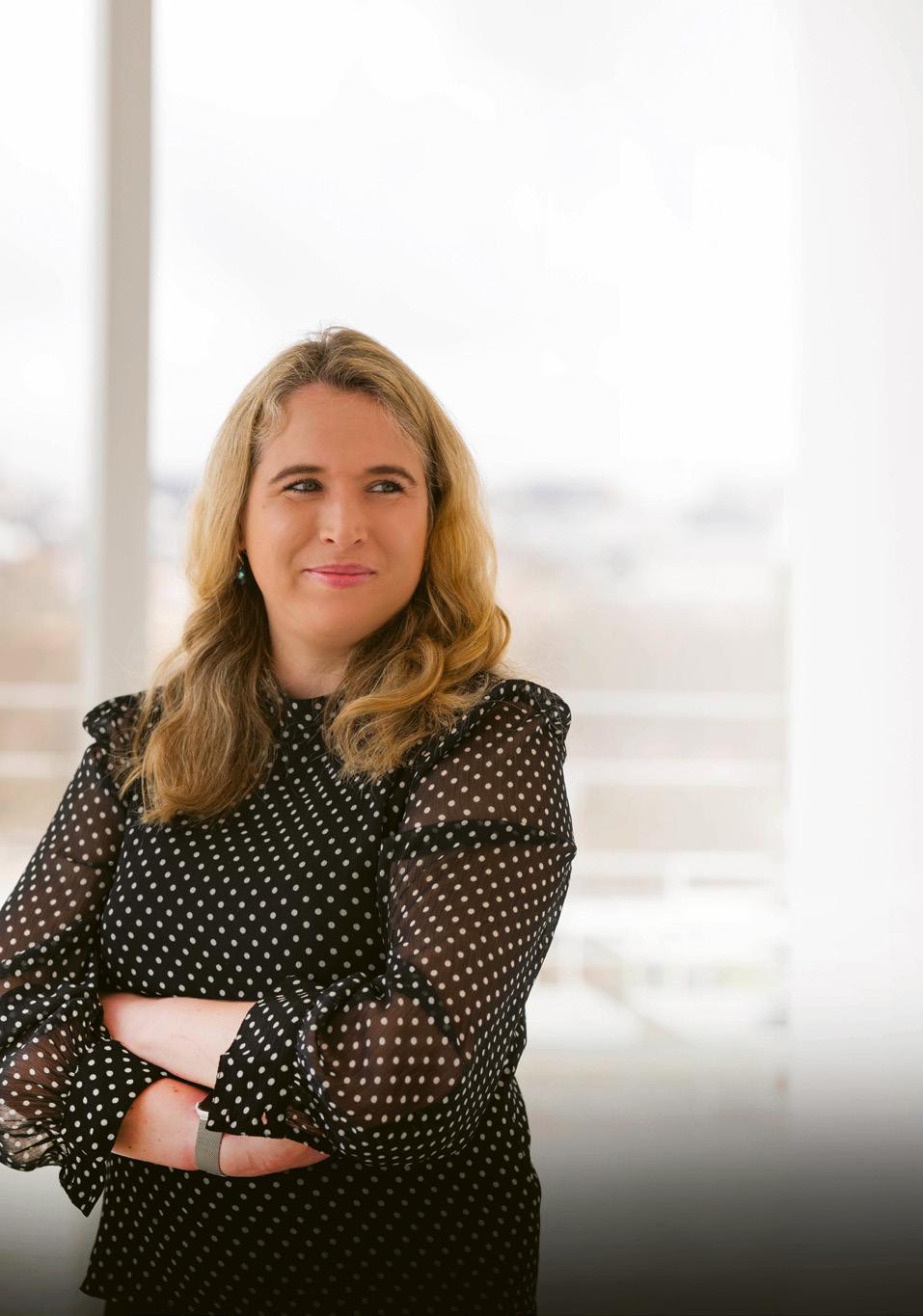

ALUMNA OF THE YEAR
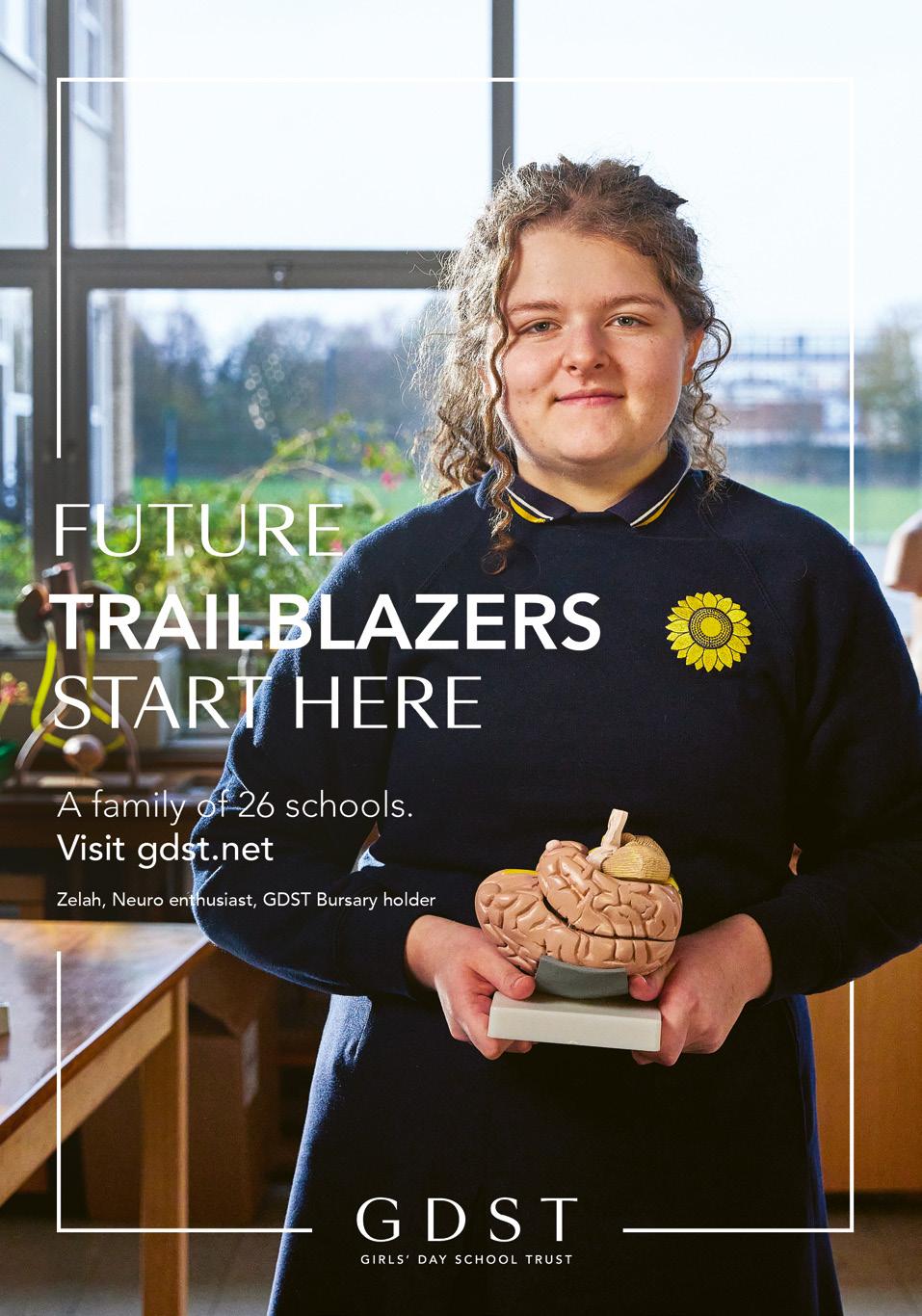
NADIA ODUNAYO
Entrepreneur Nadia Odunayo was inspired by her love of books to set up her business, The Storygraph. And while her natural optimism and energy sustain her in her goal to create the number one reading app in the world, it was South Hampstead High School where her story truly began.
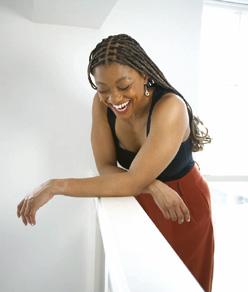
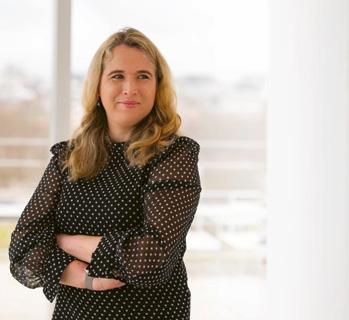
MALEHA KHAN
This year’s GDST Trailblazer, Maleha Khan, charts her decade-long journey from Year 10 student, when she first fell in love with flying, to the pilot and rocket scientist she is today – and the hardships and heartaches along the way.
FELICITY BAKER
Felicity Baker, the GDST’s Alumna of the Year, talks about her work at the BBC, and the constant fear she had as a child of being exposed as someone who stammered. She opens up about her ‘big reveal’ moment and the work she now does to support others who stammer.
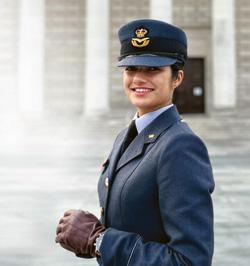
Welcome to the latest edition of GDST Life.

I always like to tell GDST girls that there are two magic ingredients that make the GDST unique – our powerful network and our history. We are very proud of our heritage and the enduring mission that lives on. For 153 years, GDST schools have been pioneers and shapers of girls’ education. Our purpose of empowering young women to achieve their full potential remains just as relevant today, as we seek to equip girls with the creativity, resilience and problem-solving skills to tackle and lead in the challenges of our time. In a world where the ‘tech bros’ of Silicon Valley tell us we need more ‘masculine energy’, where we learn it will take 168 years more to close the equality gap, we still have work to do.
It is therefore an absolute joy to celebrate the amazing women who, having left GDST schools, go on to lead remarkable lives. You, our extraordinary alumnae, shine a light on what is possible for our current students’ futures. Indeed, many of you come back to your old schools, mentor our sixth formers, give talks to our younger girls. We thank you for that.
Within this issue of GDST Life, we feature just a handful of stories from the extraordinary women in our global community whose achievements inspire and uplift. Whether championing inclusion, innovating in sustainability or leading with courage in their fields, they exemplify the true value of a GDST education. Together, they and you make the powerful GDST network that is over 100,000 women strong and now joined by the alumnae from Redmaids’ High School in Bristol, the latest girls’ school to join our GDST family.
At the GDST, our mission is steadfast: to help girls learn without limits, so that they go on to lead lives without limits. This mission is more vital than ever, as the independent schools sector faces existential challenges and a growing trend towards co-education driven by financial pressures. Our schools give our girls the space to grow and thrive, the opportunity to find their voices, to know what is important to them. With a sense of their own agency, and spotting opportunity, whatever walk of life they choose, wherever they land, GDST girls know that they have each other. They lift each other up in their successes. You are part of our story. We applaud you and wish you all the very best in the year ahead.

Cheryl Giovannoni CHIEF EXECUTIVE
EDITOR Rachel Eling
DEPUTY
EDITOR
Jackie Ashe
DESIGN
Brand+Outlines Ltd
COVER PHOTOGRAPHY
Christian Trampenau
WELCOMING REDMAIDS’ HIGH SCHOOL TO THE GDST FAMILY
Redmaids’ High School celebrated 390 years of excellence in girls’ education and was recognised by The Sunday Times as the top school in Bristol for academic excellence for the third consecutive year in 2024. Now, the school has entered a new chapter and become the newest member of the GDST, uniting two institutions with a shared commitment to delivering exceptional education tailored for girls.
Students at Redmaids’ High will enjoy a diverse range of tailored GDST enrichment opportunities, from subject-specific programmes like Space Tech and GDST-wide sports rallies to language festivals and engineering challenges, all aimed at inspiring creativity, collaboration and ambition. Nationally recognised leadership
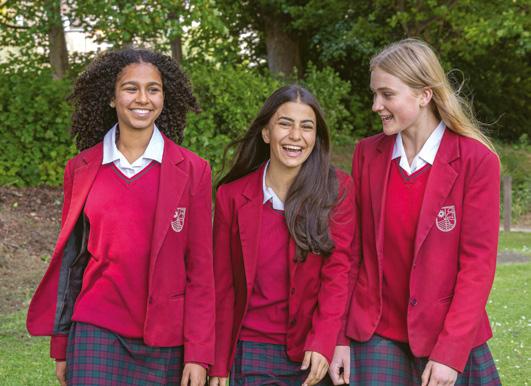
and careers initiatives, such as Leadership Enterprise Advanced Diploma (in partnership with the
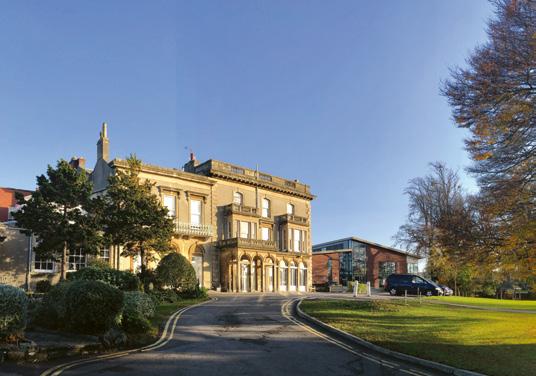
London School of Economics) and CareerStart, further equip girls with the confidence, skills and agency to become leaders and change makers.
We are also delighted to welcome Redmaids’ High alumnae into our vibrant GDST network of over 100,000 remarkable women. While alumnae will continue to enjoy reunions and networking events at their school, they will now also benefit from access to a wide range of events hosted centrally by the GDST, along with news and updates from schools across the network. The accomplishments and contributions of Redmaids’ High alumnae will enrich our community and serve as a powerful source of inspiration for the next generation of GDST girls.
SHARING OUR KNOWLEDGE: SHAPING THE FUTURE OF GIRLS’ EDUCATION
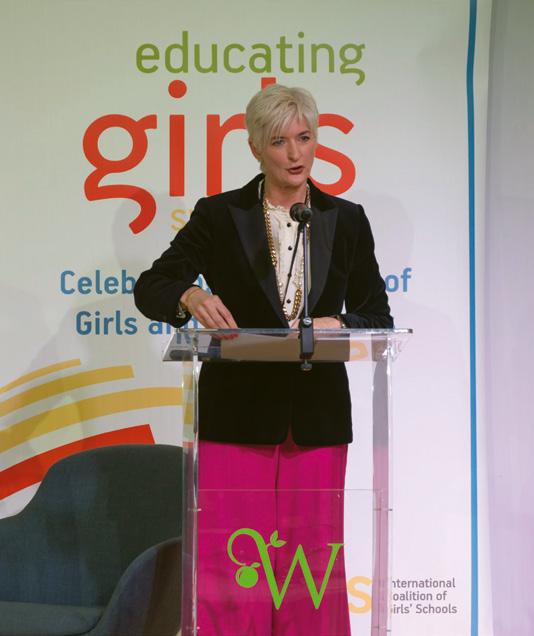
As a global leader in girls' education, the GDST continues to set the agenda with bold ideas and transformative research. Our latest publication, the GDST Insights Report: Designing the Future of Girls' Education , lends significantly to the ongoing dialogue about how we can best support girls to thrive in an ever-evolving world.
At the heart of our public purpose to reach as many girls as possible, supporting and empowering young women to achieve their full potential, the report introduces a framework centred around three core pillars: Classroom, Curriculum and Culture. These guiding principles provide educators, parents, and policymakers
with the insights and tools necessary to unlock each girl’s full potential, addressing the persistent challenges of inequality and societal bias.
The framework was first introduced by GDST Chief Executive Cheryl Giovannoni at the International Coalition of Girls’ Schools (ICGS) UK Educating Girls Symposium, hosted at Wimbledon High School in November 2024. Over 200 education leaders, academics, and advocates from the UK and around the world came together to explore strategies for nurturing and empowering the next generation of changemakers.
Heads, teachers, and subject specialists from 20 GDST schools were joined by international colleagues from the US, Canada, Australia and New Zealand, engaging in essential discussions on the latest challenges and opportunities in girls’ education.
For the GDST and our global partners, this was not just a conference - it was a powerful demonstration of our shared commitment to designing a better, brighter future for girls everywhere. We are proud to lead the way in shaping that future.
Read the Insights Report here:

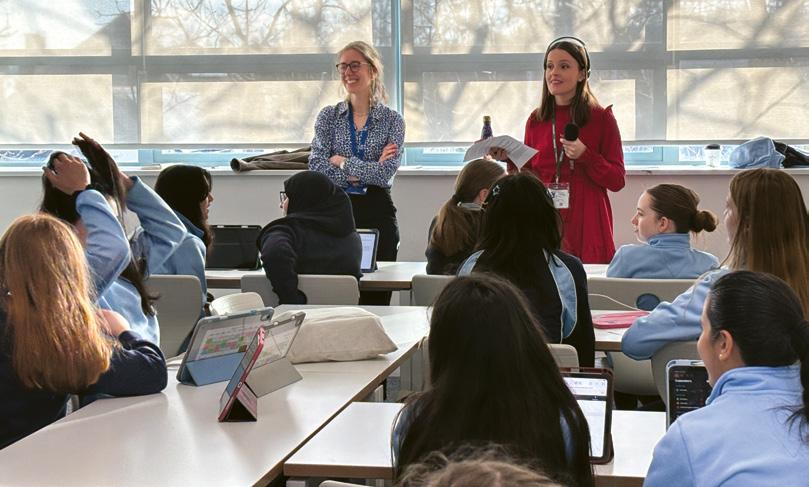
GDST GIRLS USE THEIR VOICE
With national elections taking place in 64 countries last year, including the UK, US, France, South Africa, Mexico and South Korea, nearly half of the world’s population felt the impact of democratic decisionmaking. Against this backdrop, the GDST has been championing the importance of helping girls find and use their voices, empowering them to shape a future grounded in progress and equality.
Across our schools, political societies are buzzing with lively and challenging debates, and mock general elections are currently the most popular activity. These events give girls the opportunity to raise - and debate - ideas from across the political spectrum, explore the power of social media in modern campaigning and understand how
policies are shaped and shared in the public sphere.
Several GDST schools including Bromley, South Hampstead, Howell’s, Shrewsbury, Streatham & Clapham and Wimbledon High, have hosted mock elections where student candidates present manifestos from major political parties, culminating in school-wide votes. Elsewhere, students have taken on the role of vote counters, checking the validity of ballots to help deepen their understanding of the mechanics and integrity of the electoral process.
At Croydon High School, students are being encouraged to find ways to propose and defend ideas and beliefs that may not be their own and therefore learn to take the ‘big picture view’.
Meanwhile, Blackheath High School was recently featured live on BBC London with its innovative Civil Discourse programme, designed to teach Year 7 students the skill of disagreeing well.
Deputy Head Academic, Kristina Lewis, led the class and emphasised the importance of these skills: “This is not just a discrete lesson. You take these skills with you so you can navigate these discussions and hold your ground, use your voice, and be the leaders and changemakers of the future.”
At the GDST, we believe we are educating tomorrow’s leaders. That is why we are committed to teaching girls the art of civil discourse and the power of speaking up, especially when it matters most. We believe now is that time.
EXPAND YOUR NETWORK AND BUILD YOUR SKILLSET
Over the past year, we have been delighted to welcome alumnae from across the GDST community to our networking evenings in London. Built around personal development with the opportunity for networking, each event features an inspiring speaker - an alumna sharing her professional journey, personal insights and expert advice.
FEMALE ENTREPRENEURIALISM
Award-winning founder of REALWORK and widely regarded as ‘start-up royalty,’ Fleur Emery Rice went to Portsmouth High School. She spoke with passion about the transformative impact of women supporting women, noting that female-founded businesses are not only more likely to be profitable but also tend to prioritise social impact. She also offered a candid and compelling account of navigating ADHD and shed light on what it means to forge a successful, unconventional career in a traditionally male-dominated landscape.
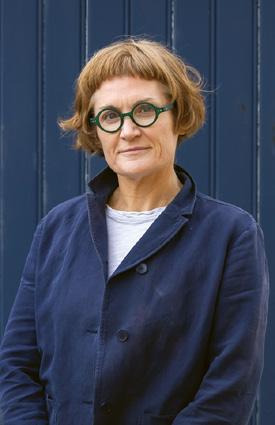
“Businesses founded by women are 21% more likely to be profitable and 27% more likely to create social value.”
Source: Alison Rose Review of Female Entrepreneurship, a 2019 government report
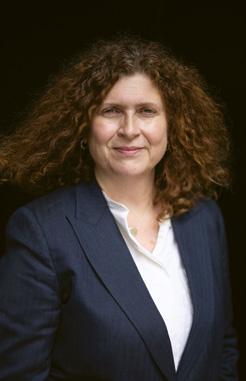
FUTURE-PROOFING YOUR CAREER
Nottingham Girls’ High School alumna, Isabel Berwick, brought her wealth of experience from the Financial Times, where she is a senior journalist, host of the Working It podcast, and author of The Future-Proof Career . Isabel offered sharp, practical advice on embracing nonlinear career paths, managing challenging workplace dynamics and reimagining what professional success looks like in a fast-changing world.
“Accept that there is no control, and stay curious, alert and open-minded.”
BUILDING CONFIDENCE AND COMMUNICATION SKILLS
Bromley High School alumna, Jane Quinn, is a West End performer and founder of The Speakers’ Toolkit. Leading an energising masterclass in public speaking drawing on her theatrical training, Jane guided guests through interactive voice, breath and posture exercises designed to boost confidence and elevate communication skills.
“An incredible event –wow did I walk away with some valuable tips from the fabulous Jane Quinn! Thanks to the event organisers for such a fantastic session.”
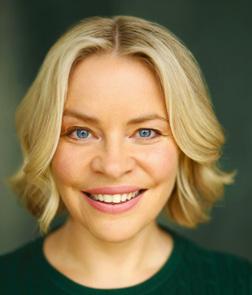
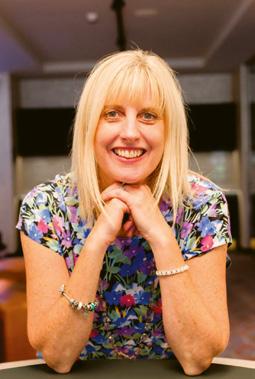
BREAKING BARRIERS
Nikki Alderson, Sheffield Girls’ alumna, is a talent retention specialist, coach, keynote speaker and former criminal barrister. In her keynote talk, Breaking Barriers to Being Your Best, Nikki reflected on her remarkable journey as a barrister working on human rights projects and helping to overturn wrongful convictions in Jamaica. She spoke about how these experiences shaped her perspective and empowered her to support others in achieving their potential.
“Be flexible and adaptable, when you lean out from the ladder you see other opportunities.”
Our networking events offer a wonderful opportunity to reconnect with the GDST network, exchange ideas, and be inspired and empowered. We would be delighted to see you at our next gathering - visit our online events page for upcoming dates.
https://bit.ly/GDSTAlumnae_events
SCHOOL MEMORIES my
Hayley Kennedy, traveller and adventurer, remembers her time at Bromley High School and talks about her physical and emotional journey travelling to all 193 UN countries as a visually impaired alopecian.
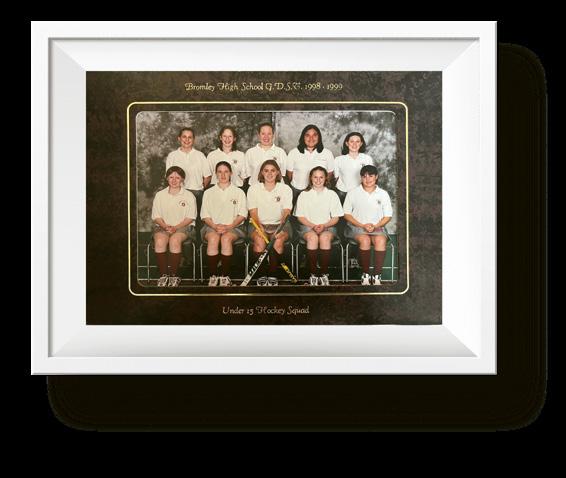
September 1995 at the age of 11, having been to primary school at Darrick Wood. To get a place at the school, I had to pass the entrance exam and interview with the head teacher, Mrs Hancock. I remember feeling totally intimidated – both during the interview and on my first day there. I was very shy, and only knew one other person who had come
else seemed to know each other, so I felt very disorientated and lost. I was really small for my age, too, so everyone felt like giants to me!
The school had extensive grounds, next to the woods, and a swimming pool - which was unheard of for most schools - a gravel hockey pitch and an athletics track. I enjoyed sport, and was really looking forward to learning
hockey and playing more netball. 1995 was an interesting year. There was the trial of OJ Simpson for the murder of Nicole Simpson and Ron Goldman, and the collapse of the UK’s oldest merchant bank, Barings, owing to a 28-year-old trader losing $1.3bn in unauthorised trades in Singapore. Culturally, we had our first taste of a Michael Keaton-less Batman , and Die Hard with a Vengeance (one of my favourite films) was the highest grossing film of the year. The DVD was invented and Gangsta’s Paradise was the year end number one in the charts. If I’m honest, I was oblivious to much of what was going on, and had no fashion sense back then. I’m not sure I do now, either!
I would get the ‘S’ coach to school, which is how I met my good friends, Sarah O’Connell and Natalie Balaratnam. But I also had other friends from across the three classes in our year. The hockey and netball players – Emma Howick, Anna Brew, Vicky Middleton and Jenni Allen - as well as those for whom sport wasn’t their favourite hobby, including Nicole Regan and Clare Williams.
Overall, I would say we had a great year group and generally everyone got on pretty well.
Of the staff at Bromley High School, special mentions have to go to Miss O’Rourke and Mrs Cummings. All I wanted to do was play hockey and netball all day, and they were my two favourite sports teachers. I was in the hockey and netball teams and would try and play sport every lunchtime! If it was out of season for hockey and netball, I was doing athletics and tennis. Whatever sport there was to do, I wanted to be part of it. We were a great hockey team, and we won most of our matches. It taught me what it was like to work as a team and to succeed, something that I have taken into my work life now when I am leading strategies for tender responses or presentations to prospective clients.
English and physics were my least favourite subjects, so it is a little strange that I started writing about my travels… I tend to think
it was more about succumbing to peer pressure than anything, as so many people told me I had to write about my adventures.
It all started with my first trip in 2001 to Namibia with World Challenge, which was organised through Bromley High School. Then, after I started work, I made it a goal to try and go somewhere new every time I travelled, beginning with Asia and South America.
In 2014 I was diagnosed with Stargadt disease and was looking at losing my eyesight. This spurred me on to prioritise travel at every opportunity. Soon, I was travelling every holiday, at weekends and on public holidays. It was exciting: every trip was something new to try, see or do. Even since I’ve finished my UN 193, I still travel constantly (a lot for work as well) and there is always somewhere new to go!
It took until my late twenties to truly come out of my shell. But I can definitely say that school gave me my identity and the skills and knowledge
to work things out when there was no clear way forward. It gave me the strength to be independent, to ‘go it alone’ and to keep going, particularly when I lost my hair to alopecia in 1998. I learned negotiation and problem-solving and felt I had the freedom to grow into the person I wanted to be. It definitely paved the way to the success I have now, and if I look at my friendship group too, I would say we have all done incredibly well for ourselves – thanks in part to the education we got at Bromley High School.
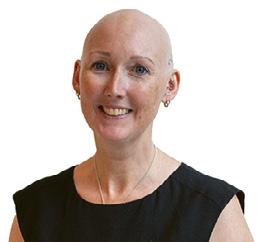

Kennedy Bromley High School alumna Hayley Kennedy is the first disabled person in the world to visit every single country – 193 in total – recognised by the United Nations. In 2024 alone, she visited 42 countries including Tahiti, French Polynesia and Iraq, alongside her full-time role as an insurance broker and risk manager in the energy industry and volunteering with Moorfields Eye Hospital and Alopecia UK.
baldblindbeautifultravels.com
SHELFIE
Ella McLeod, an alumna of Streatham & Clapham High School and author of two Young Adult novels talks about the books that have inspired her.
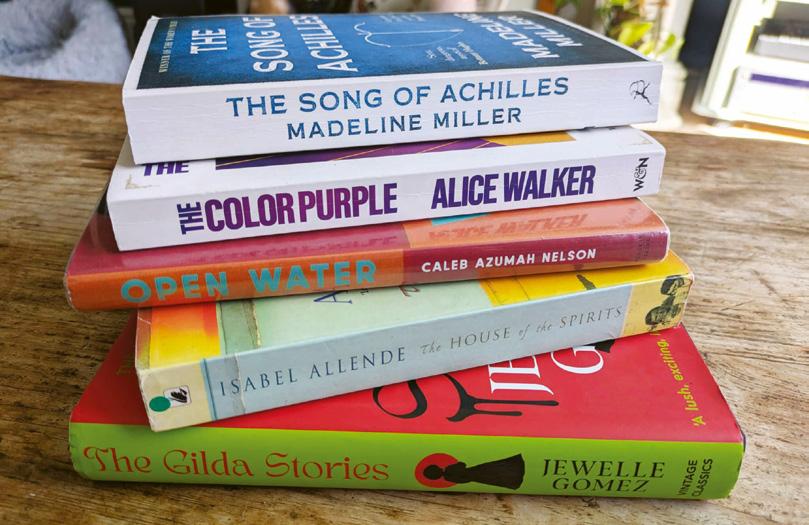
The Gilda Stories, Jewelle Gomez
A series of vignettes in the life of a woman who comes to be known as Gilda. Once enslaved, she runs for freedom and into the arms of the vampire. All that humanity was and is, is seen by Gilda, as we follow her through the ages of her subsequent immortality. All that she takes she strives to give back and so spends
many, many lifetimes wondering what it is to refuse to do the same. This book, a searing meditation on love, loss, and life with black femininity at its heart, makes tender demands of its reader. I’ve always been a lover of the gothic, of stories that exist in shadows, for all their moody atmosphere and dark deeds. What I believe makes this book so special, is
that it asks, ‘What do the shadows see of the light?’
The House of the Spirits, Isabel Allende
It’s funny how books find you at the right time. I’d tried to read this when I was about 17 and just couldn’t get into it: it wasn’t the right fit. In it, Allende examines
the impact of class and politics on familial bonds as we follow the Trueba family across generations in Chile. It chronicles their personal and societal struggles, exploring themes of power, love, betrayal, and revolution. I returned to it again at 23 and in reading it I felt something unlocking inside me, a door opening on some inner room I had known was there but, having struggled to open it, would merely point to it and say, ‘See, there’s something there.’ And then be frustrated that no one took that ‘something’ seriously. I fell in love with magic realism reading this book: I fell in love with the way good literature can speak to the truth that lies beneath the statistics and systems of oppression. If I could ride a book into battle it would be this one.
The Color Purple, Alice Walker
Set in early 20th-century Georgia, the novel follows Celie, an African American woman who endures abuse but comes to love the life she has been given through letters to her sister and the relationships she formed with the women around her. As devastating as it is uplifting, I remember reading this book for the first time and see reflected back at me someone else who understood what it was to utterly adore women. To find solace and strength in their company and, through shared affection, selfacceptance. I loved that Walker finds poetry in dialect and music in sexuality but most of all I loved the way Celie reclaimed autonomy over her spirituality. ‘I think it p*sses God off if you walk by the color purple in a field somewhere and don't notice it,’ is the quote that everyone knows. And for good reason. But don’t sleep on this, ‘Dear God. Dear stars, dear trees, dear peoples. Dear Everything. Dear God.’
The Song of Achilles, Madeline Miller
From the moment I read the description of Achilles heels as ‘pink as licking tongues,’ I knew I was a goner. Intimate and raw, I read this in 2022, just before my debut novel came out, and as a writer in the retelling space this book blew the possibilities of what engaging with myth and folklore could do. The way Miller weaves together themes of love, fate and legacy, deftly interrogating what it means to be immortal, what it means to be remembered – well, it lit a match within me and that match lit a candle and that candle became a fire and that fire became Andromeda (my adult debut, out May 2026, published by Transworld.)
Open Water, Caleb Azumah Nelson
A love letter to South London (particularly my beloved South East London), to music and to love itself, this novel lives close to home and cut even closer to my quick. Yes, it is about race and masculinity and the thorny messiness of trying to live with your identity (small i) and your Identity (capital I) while meditating on what those things actually mean, whether or not they’re things that we are or things that we do. But mostly, it’s about falling in love. Honestly, I love love, I love reading about love and I really really love reading what very clever people have to say about love. Open Water is lyrical, vulnerable and insightful, finding remarkable poignancy in the minutiae of a romance between two twenty-somethings in a summertime city. Never before have I, a Black 20-something from South East London, felt so seen. What is a joint, what is a fracture, what is a break?
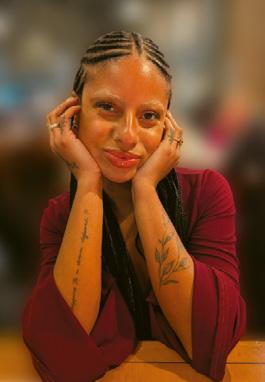
Ella McLeod
Ella McLeod is the author of two Young Adult novels: Rapunzella, Or, Don’t Touch My Hair (2022) is a retelling of the Rapunzel story that explores themes of race, gender and coming of age. It was nominated for the prestigious Branford Boase Award and received rave reviews in Kirkus, the Irish Times, and the Guardian. Her second novel The Map that Led to You (2024) is a romance which interweaves pirate and Caribbean mermaid mythology, and was a Guardian Best Books Pick. Both are published by Scholastic in the UK and Yellow Jacket at Little Bee in the US. Andromeda, her debut adult novel, will be published next year. Ella graduated first in class in English Literature with Theatre at Warwick University and also hosts the podcast Comfort Creatures on the LAbased Maximum Fun network.
NOTES TO
Living proof that variety is the spice of life, Dr Danielle Sanderson (Brighton Girls) talks about the multiple careers she has enjoyed - from running for Great Britain to her current role as an associate professor at UCL - and gives her younger self some life tips.
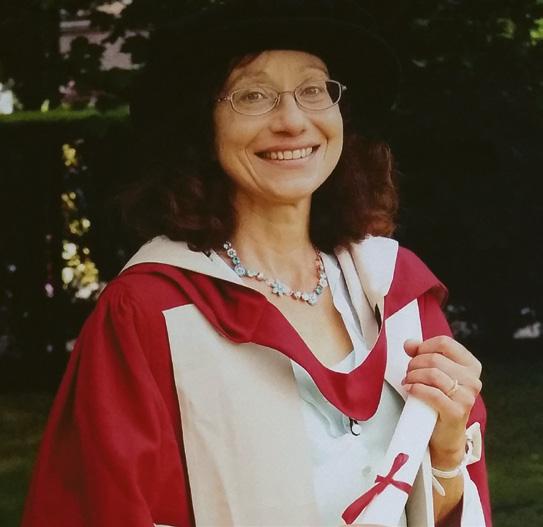
Thinking back to my school days, I remember my uncertainty and excitement about the future. When asked about my career, my answer was always a bit nebulous, as I didn’t see myself doing just one thing forever; rather, I envisaged having several careers.
My career ambitions went through various iterations. For a long while I wanted to be a doctor, until I
understood that I would be too squeamish to take A level biology, and the idea – as a vegetarian since the age of six - of dissecting cadavers as part of a medical degree was simply too much. Another thought was to be a presenter on Tomorrow’s World, a TV show which covered a wide range of futuristic and innovative topics, many of which have come to fruition, such as hybrid working.
Nowhere on my radar, though, was a career in athletics. At school, I was a second team player, and as athletics wasn’t offered as a sport, I had no inkling that I could run. But I was always driven, competitive, and ambitious.
After university, (I read physics at Oxford) I went to work at CERN (The European Organisation for Nuclear Research) in Geneva before joining
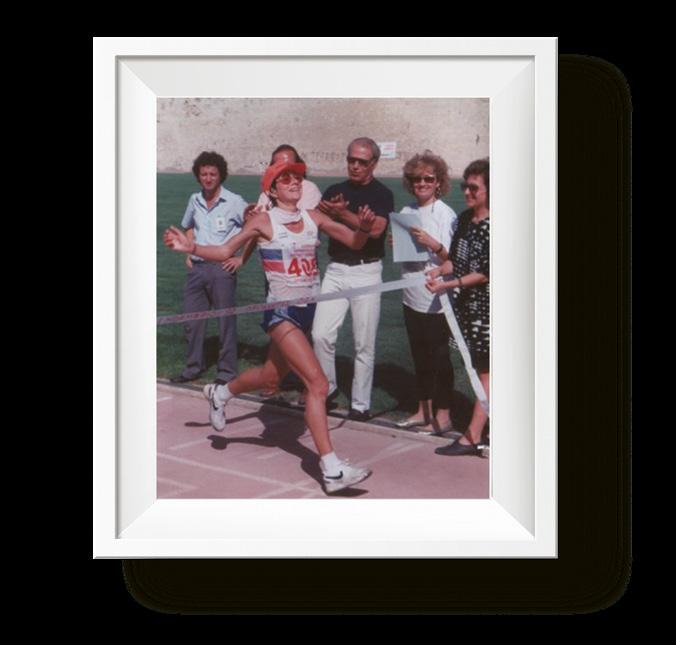
a company working in operational research and computer programming. My first career.
A few years later, I moved into training and taught various courses, including computer programming, project management, effective business writing, and presentation techniques. My second career.
We always included goal setting and action planning in these courses, and so I thought I should set some goals of my own, too. These included running a marathon in under three hours – something that I achieved in 1990 when I ran the London Marathon in 2 hours 50 minutes. This led to an athletics career alongside working and having a family, in which I represented Great Britain 21 times, including at the Commonwealth Games and World and European Championships. My third career.
I also worked as a freelancer for a real estate consultancy advising commercial property owners on
tenant satisfaction. My fourth career, which led to my fifth.
The managing director wanted to sponsor a PhD to research the return on investment in customer service in the property industry, and I was the successful recipient of this opportunity. So at the age of 50, I embarked on my fifth career as an academic. After completing my PhD, I became a lecturer at UCL and am currently an associate professor of Real Estate and program director for the BSc in Urban Planning and Real Estate.
“Be flexible and open to serendipity and unexpected opportunities.”
To my school-aged self, therefore, I would advocate having plans, goals, and ambitions, as it is deeply
satisfying to achieve these. But, be flexible and open to serendipity and unexpected opportunities. I would reassure my younger self that straight As are not as crucial for a successful life and career as I had thought. And finally, I would say don’t put unrealistic pressure on yourself. Things will work out satisfactorily over multiple careers.
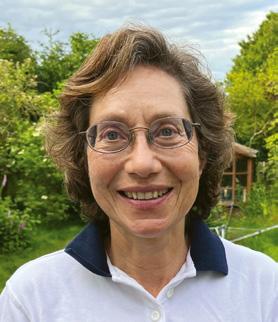
Dr Danielle Sanderson
Brighton Girls alumna Dr Danielle Sanderson is Associate Professor (Teaching) at UCL, The Bartlett School of Planning. Before her current role, she worked as a consultant in the real estate sector, an analyst programmer at the multinational software company, Sema Group, and at CERN in Geneva. Concurrently, she has also represented Great Britain 21 times at marathon, half marathon and ultra marathon events, winning the Crete marathon on her GB debut, winning the London to Brighton ultra-marathon and setting a world record for Women’s Masters at 50km.
STORYGRAPH – A TALE STILL IN THE MAKING
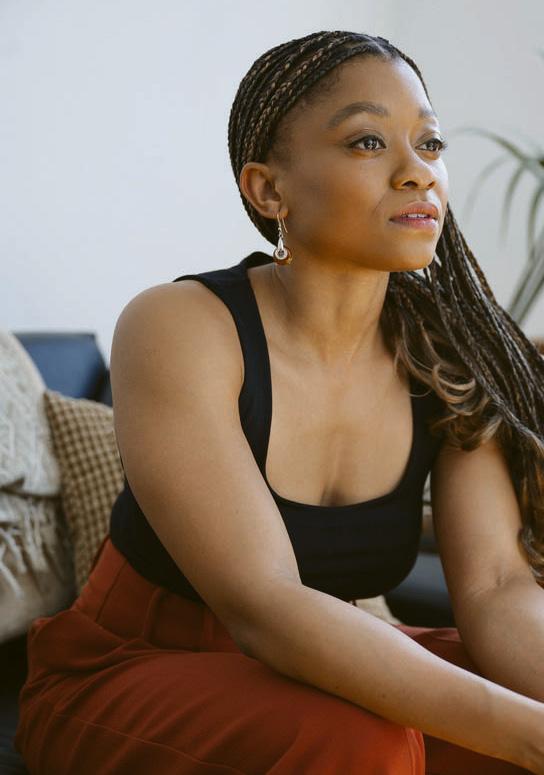
Nadia Odunayo, founder and CEO of reading tracker app The StoryGraph talks about her business, her busy-ness and her bursary to South Hampstead High School
Photograph by Boyd Visuals
NADIA ODUNAYO

Dancer, runner, avid reader, continuous learner, friend and Netflix fan are all facets of Nadia Odunayo. But above all, what shines through is her indefatigable optimism and the energy she puts into everything she does.
So, it is no surprise that just six years after starting her business, with a period in investment banking and advanced coding skills already under her belt, Nadia’s The StoryGraph app is in profit, in constant development and with almost 5 million users, is already nipping at the heels of Amazon’s Goodreads. Her ambition is to create the number one reading app in the world.
It all started one January morning in 2019, when Nadia sat down with the rare luxury of time and financial resources provided by her previous job, to ponder her next move. As a keen runner, she considered creating an app that auto-generated running routes – but of course, it was the books app, The StoryGraph, that won the day. She recalls, “That was the moment where I was like, ‘I have to work in books.’ This was the most fulfilled that I’d ever felt doing coding work.” Just two weeks later, The StoryGraph was born.
“I have to work in books. This was the most fulfilled that I’d ever felt.”
The business is completely selfsufficient, and with only a handful of staff based in the UK and California, is a very efficient, lean machine. So, with all her other interests – and her lifestyle really is busy - how does Nadia do it?
“I think I’m lucky in terms of my brain chemistry,” she says, “in that I am inclined towards optimism. I
love what I do. I see The StoryGraph as my life’s work, and I think being generally positive, optimistic and happy – which I’ve always been –makes everything easier. Because it is hard work. It’s a lot.”
To keep her energy high and her state positive Nadia keeps busy. Very busy. “I think doing all these things is what helps me keep going,” she says. Things like getting up early to make a dance video with her dance teacher. Or a full morning gym session, often a lunch break with Netflix for company and every day, some reading time. It might also be lunch with a friend or a dance class in the evening, a morning walk, meditation and a call with her father. Her days are packed - even without her ‘day job’ – which she manages by organising her time into three-hour blocks.
And her work-rate is staggering. To go from 0 to nearly 5 million users in only six years is remarkable. And there is plenty more in the pipeline. She runs through her “high level 2025 road map” which focuses on three key areas – user interface, user experience and performance. “I’m working on a big redesign so that everything [on the app] looks beautiful, flows well and is intuitive, but also super-fast. That’s Q1. Then, I want to improve the organisational features, give people more ways to leave messages and discover book clubs… and a feature where people will be able to like, share and save their favourite quotations. Essentially, we’re going to create a bunch of social reading features, and finesse and fine-tune what we already have.”
To use Nadia’s own words, it’s a lot. How does she manage it all, and what’s the secret to her success? “Be adaptive. Enjoy each day. You don’t know what tomorrow will bring, but always be prepared for things to switch up.”
“I think it all started with South Hampstead.”
Nadia Odunayo joined South Hampstead High School on a bursary, at the age of 11. So, how does she remember her school days, and how does she think they may have shaped her?
“They shaped me massively,” she says. “I was on a bursary, so the girls around me there had a different upbringing from me. Everyone was lovely and welcoming, and I remember being like, ‘Oh, these girls have a lot of confidence and a lot of opinions.’ I felt I’d always been kind of sociable, but not necessarily confident to share opinions. I wasn’t sure what I thought about things.
“I had always been academic,” she says, and recalls how the reporting system at South Hampstead motivated her to excel. “I think it all started with South Hampstead. I mean, obviously it all started from my parents, but it was South Hampstead that instilled the inspiration to be academically excellent and to learn to soak it all in. I was surrounded by incredible girls who inspired me to open my eyes to different perspectives.
“Going forward, I might look to do more advising or mentoring. I love it when I’m invited back to schools to talk to the girls, and there are people who either look like me or they come from a poor background, or both. I think people might look at my story – especially when they hear I went to Oxford – and assume I came from a rich family. But no: it all started with financial awards.

“One of my favourite pieces of feedback is when someone tells me that I’ve inspired them.”
Nadia Odunayo
“One of my favourite pieces of feedback is when someone tells me that I’ve inspired them. So, in ten years, if I’m still running my company and it’s still going well, and I’m doing other things that are inspiring to other people – whether that’s mentoring or a spin-off product, or educational things - and I’m still dancing, then that would be great.”
Nadia is the founder and CEO of The StoryGraph. A graduate in Philosophy, Politics and Economics at University College, Oxford, Nadia then went on to become a software engineer and product manager. The StoryGraph, the reading tracker app she founded in 2019, already has almost 5 million users, and with tight management and highly innovative technology, is on a mission “to enhance the lives of avid readers everywhere and to inspire non-readers to get into reading.”
@nodunayo / @the.storygraph / thestorygraph.com
PHILANTHROPIC INCOME AND IMPACT 2023 - 2024
1,420 gifts received from generous donors
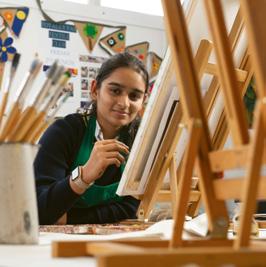
£2.5 million raised for Bursaries and Financial Assistance
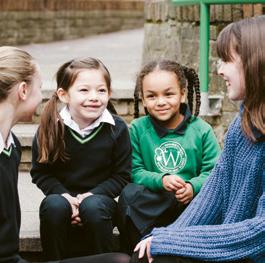
158 new bursaries awarded
984 students benefited from a GDST bursary
447 students benefited from a 100%+ bursary
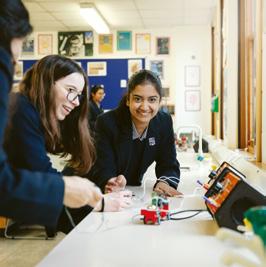
Nearly £900,000 left to the GDST in legacy gifts
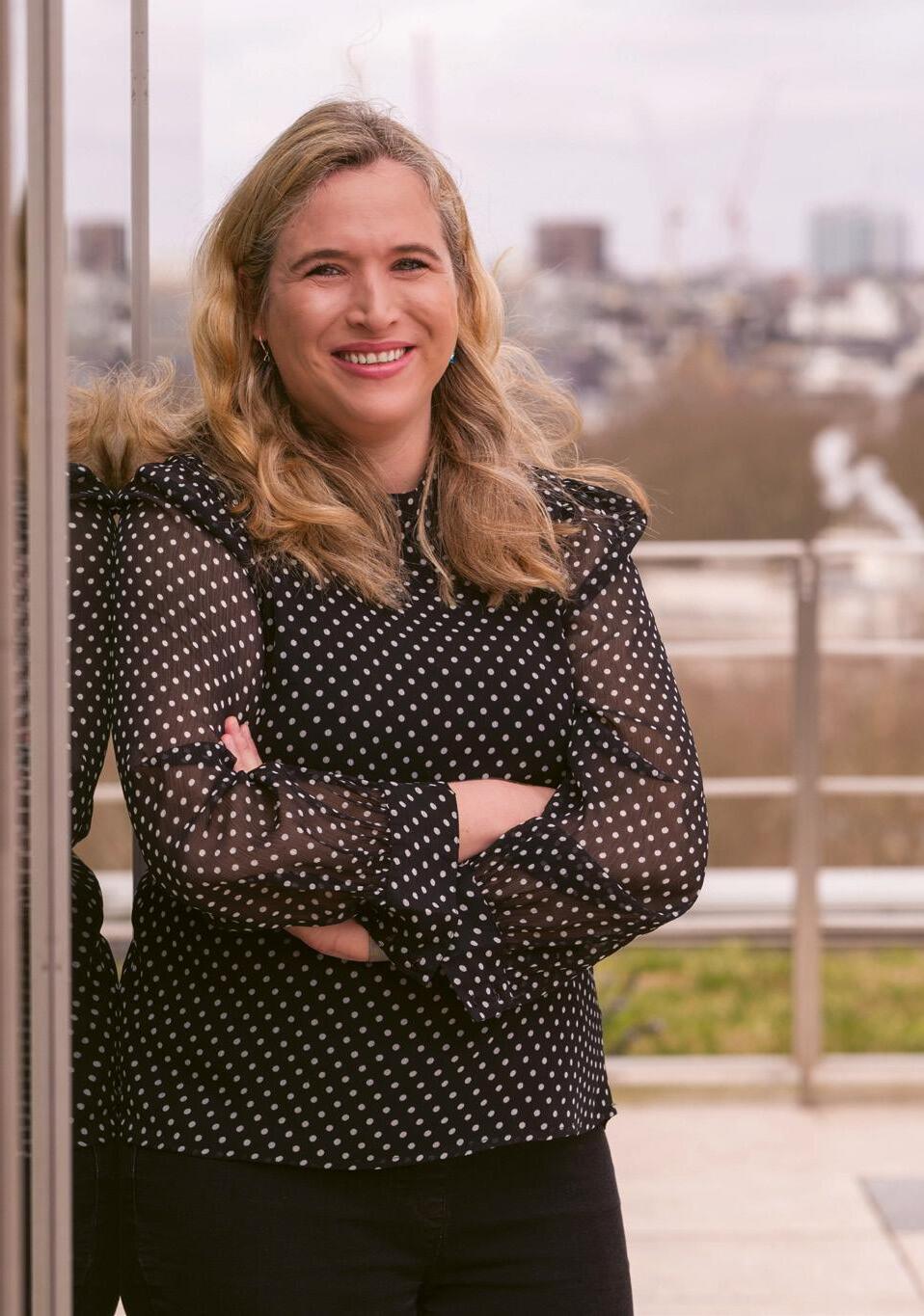
WIMBLEDON HIGH SCHOOL’S FELICITY BAKER
ALUMNA OF THE YEAR
Photograph by Christian Trampenau
Felicity Baker has worked in news for the BBC for 16 years, covering stories from the coronation of King Charles to the war in Ukraine and last year’s 80th anniversary of the D-Day Landings, to the Corporation’s coverage of the Eurovision Song Contest and Glastonbury. It is Felicity’s personal story, though, that has recently put her in the spotlight.
The GDST’s Alumna of the Year and Wimbledon High School alumna Felicity Baker has a warm, easy manner, a quick smile and a great speaking voice. “Quite a broadcast voice,” as she puts it. The perfect package, you might think, for a career in broadcast media.
Felicity also has a stammer. Her stammer is something she never thought she would talk about beyond her family and closest friends. It is also something that most people would never know, because she manages it so well. Even more surprising, her stammer is the very thing that led to her - at huge personal risk - putting herself in front of the camera for the first time, to help others, after a lifetime of feeling anxious herself.
Looking back at her school days and early career, she says, “I was living in constant fear of being revealed as a person who stammered. For years, that was my biggest fear, particularly at school. When you're 11, you want to fit in and just be like everyone else. I was desperately trying to appear like I was fluent. And the sleepless nights I had over that caused me a lot of stress when I was younger.
“And [at work] I was terrified that people would think I wasn’t good at my job, that my stammer would impede my career. I put so much pressure on myself.”
And she really does put pressure on
herself. After school, she completed a degree in English and then went on to do a Masters at RADA, something she believes may have been about “proving a point to my younger self to say ‘I can actually do this.’”
Felicity was determined to break into broadcast journalism, and says, “I kept applying to the BBC and eventually… it was actually my stammer that got me the job there. I owe everything to having that because I got into the BBC through the Extend Scheme*.”
“I was living in constant fear of being revealed as a person who stammered.”
After more than ten years there, during which time Felicity’s career blossomed – from her start as a broadcast assistant on the Andrew Marr Show, then onto BBC Westminster, BBC Breakfast and later as a senior journalist at BBC News at One, Six and Ten, before becoming Royal Producer –a chance conversation with news anchor Sophie Raworth led to Felicity’s ‘big reveal’. Sophie, a long-time, trusted colleague (and fellow GDST alumna, from Putney High School) was stunned to learn that Felicity stammered and
encouraged her to talk about it.
And so Felicity’s first piece about stammering, a short news piece in the lead-up to former US President Joe Biden’s inauguration (who talked about his own stammer), appeared on the BBC in early 2021. Such was the response, it wasn’t long before Felicity was asked to produce and front I Can’t Say My Name, a 30-minute documentary film about stammering, which aired just a few weeks later.
Looking back at the whole experience, Felicity says, “It was terrifying. Absolutely terrifying. It was definitely the scariest thing I’ve ever done, and I still can’t quite believe I did it. I’d never done anything on screen before, so that was my first time in front of the camera. It was all very new to me, but it changed everything and I’m forever grateful for that documentary.
“Stammering is something that I’d hidden for so long. I was really worried about the reaction from social media - because it's not always a very pleasant place - to the point where I nearly pulled out a few days before and wasn't sure I could go through with it. Anyway, we did go through with it, and I don't think I saw a single negative reaction to it. Actually, it was all really positive.
“It was amazing. I realise now that speaking about stammering helps
“It was terrifying. Absolutely terrifying. It was definitely the scariest thing I’ve ever done, and I still can’t quite believe I did it. I’d never done anything on screen before, so that was my first time in front of the camera. It was all very new to me, but it changed everything and I’m forever grateful for that documentary.”
other people be more open about it. I never thought I'd be in a position to help anyone else - but that's been a real privilege.”
Felicity now finds herself very much in demand, and tells us that a followup documentary to I Can’t Say My Name will be airing shortly. Alongside her day-to-day work at the BBC, she is a Trustee of Action for Stammering Children, has set up the Stammering Support Network at the BBC, and works closely with the Michael Palin Centre for Stammering (Sir Michael Palin gave his name to the Centre and became Vice President of Action for Stammering Children in 1993). She also visits schools, including her alma mater, Wimbledon High School.
When asked what advice she gives at her school talks, and to others
through her work in stammering, Felicity says, “I think the main message I go with is that I wish I’d spoken out a bit earlier. I have no regrets about the way I’ve done it, because everything has worked out for me. But if I could offer advice to people, it would be to be more open, but also to be kind to people, because you never know what they are dealing with behind the scenes.
“I had no idea that being open about things can help so much. So, even though it was really difficult for me to do it – I still find stammering uncomfortable to speak about – the reaction I had from the public made it all worthwhile, so I’ll keep doing it.”
She pauses for a moment before adding, “Always be brave. I think that’s the thing.”
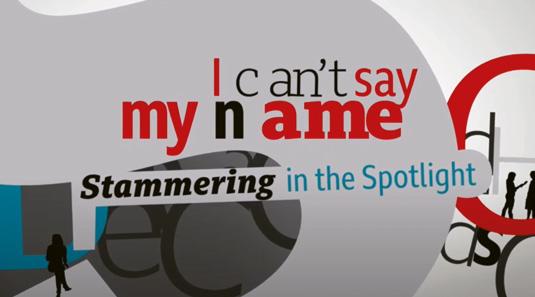
*BBC Extend is the BBC’s positive action employment programme for people who are deaf, disabled or neurodivergent.
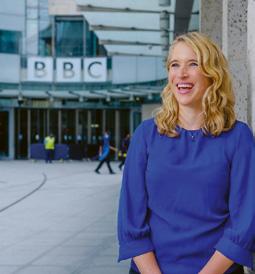
Felicity Baker
Felicity Baker is currently Royal Producer at the BBC, which she joined 2009, through its Extend programme. Positions she has held since then include Broadcast Assistant on BBC Westminster and the Andrew Marr show, Broadcast Journalist on BBC News and Senior Journalist on BBC News at One, Six and Ten.
She set up the Stammering Support Networking within the BBC, is a Trustee of Action for Stammering Children, and works closely with the Michael Palin Centre for Stammering.
NOTES TO
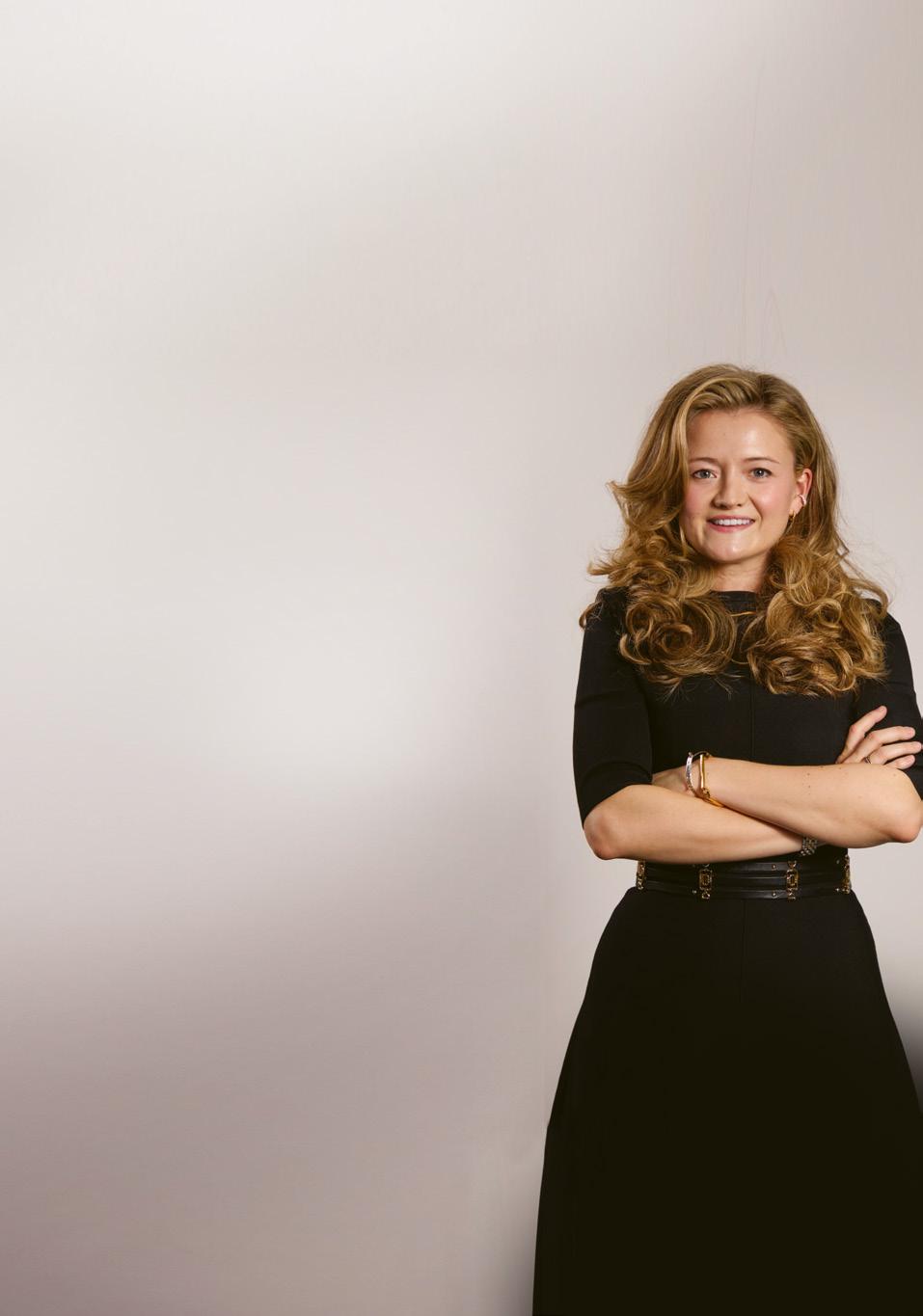
Dear Younger Abi,
If I could offer you some advice, it would be this: your goals aren’t ridiculous - trust in yourself. I know you feel pressure to have everything figured out, but life isn’t always straightforward, and it’s okay not to have all the answers right now. In fact, the unexpected twists when you think you’ve ‘failed’ are where the real growth happens and it’s never ‘rejection,’ just ‘redirection.’
You’re going to face challenges: hey, you’re dyslexic and quite neuro-spicy so sometimes they’ll feel overwhelming, but this will teach you resilience.
One thing you might not realise yet is that you have the power to make a difference. The knowledge you gain, the people you meet, and the risks you take will open doors for you (doors like 10 Downing Street*). Don’t shy away from opportunities that seem intimidating. Take them. You will surprise yourself. It’s okay to fail, but what matters is getting back up and continuing to move forward.
I know you’re not always sure of your place in the world, but remember you have something valuable to offer. Whether it's in financial literacy, advocating for change, or inspiring others, your voice as a woman and human being matters.
And lastly, don’t forget to enjoy the process and NEVER feel embarrassed about dressing up and having a bouncy blow dry. It is your superpower.
I love you, stay kind,
Your Future Self
* A regular at 10 Downing Street, Abi has interviewed the now-departed Prime Minister Rishi Sunak about the UK economy.
Abigail Foster
Abigail Foster is an alumna of Croydon High School. She is a chartered accountant and the founder of Elent Financial Education, a company with a mission to eliminate the gender pay gap through financial literacy for the next generation. She works with both corporates and schools to give children and young people a thorough understanding of all aspects of finance.
SOFIA ILYAS
A JOURNEY OF DETERMINATION, MUSIC, AND CHANGE
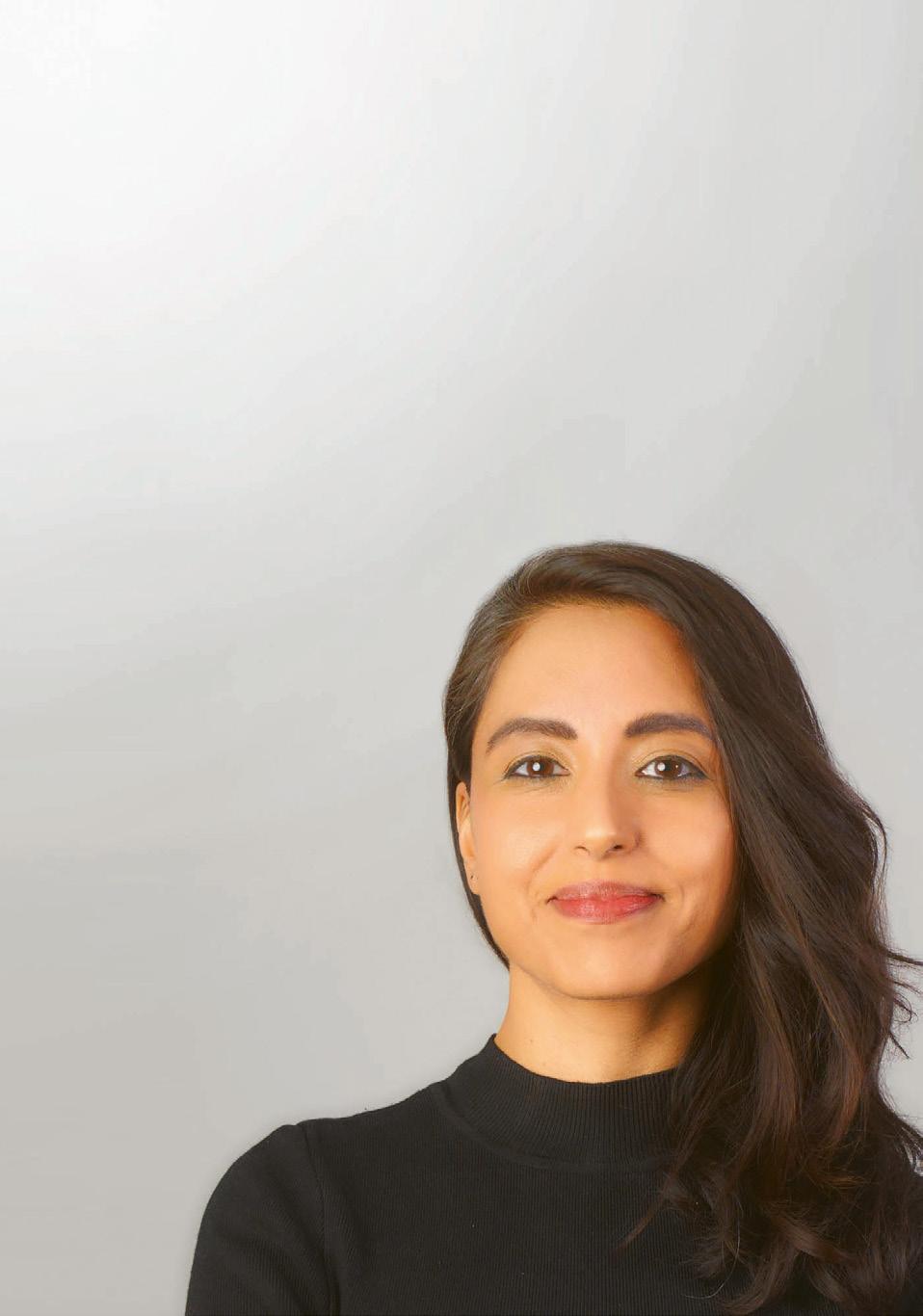
Howell’s School, Llandaff alumna, Sofia Ilyas, has an extraordinary story to tellone of defiance, resilience and a connection to music that has guided her through some of the most challenging moments of her life.
Photograph by Grace Phillips
Sofia Ilyas never imagined she would carve out a space for herself at the forefront of the global electronic music industry. As the Chief Community Officer of The Beatport Group, she is not only a leader in the field but also a determined advocate for diversity and inclusion. But before she found herself in Berlin’s thriving electronic music scene or leading diversity initiatives at Beatport, Sofia was a young girl in Cardiff, navigating a world that had set strict expectations for her future.
A CHILDHOOD DEFINED BY EXPECTATIONS
Born into a British Pakistani family in Cardiff, Sofia was raised in an environment where education was not prioritised, particularly for women. “None of my sisters had finished their GCSEs,” she recalls. “The sort of environment I grew up in was very much, you will get married very soon, and that’s going to be your freedom, and that’s your path in life.” As she approached the end of her compulsory education, she felt a deep sense of despair. “When I was finishing my GCSEs, I was just incredibly down.”
But a chance discovery altered her trajectory. Leafing through the Yellow Pages, she stumbled upon an advertisement for Howell’s School, in Cardiff. “I just noticed right away, ‘all-girls school,’ and then in my mind, I was like, ‘What if I got into this school and maybe I can convince my parents?’” With the help of a teacher, she completed an application in secret, forging her parents’ signatures. When she received her acceptance letter—along with a full bursary— she was ecstatic, but her mother was unmoved. “She turned around and said, ‘As if that makes any difference. You are not going.’”
“With this, Howell’s changed my life. They gave me freedom. I literally owe my life to Howell’s.”
FINDING SOLACE AND STRENGTH AT HOWELL’S
Despite initial resistance, the prestige of Howell’s School won over her community, and her parents reluctantly allowed her to attend under strict conditions. Her experience at Howell’s was transformative. “I remember the first year being so nervous that people would figure out I was poor, but as I met different girls, I realised a lot of them came from different backgrounds. I started observing the girls and really recognising confidence, articulation, just a completely different breed of women than I'd ever experienced.”
For the first time, she saw young women confidently articulating themselves, debating ideas, and discussing music with passion. “I was so inspired. Seeing so many highachieving women around me, I was like, ‘Maybe I can be something.’”
But her future was still precarious. As she neared the end of her A levels, the school called in her father to discuss university. His response was unequivocal: “She is 100% getting married.” This moment was pivotal, as Howell’s staff posed a question she had never been asked before: “What do you want?” Without hesitation, she answered, “I want to go to London.” What followed was six months of secret planning. Straight after her final exam Sofia headed to the train station and made her way to
a women’s refuge in London. The police were informed that she was safe, and in turn notified her parents. “With this, Howell’s changed my life. They gave me freedom. I literally owe my life to Howell’s.”
THE SEARCH FOR IDENTITY IN A NEW WORLD
The transition to London was anything but easy. She lived in a temple for three years, grappling with the cultural shock of her new environment. “Growing up, not drinking, showing my hair in public, wearing makeup - it was all new to me.” Music became her anchor. “It was the first time in my life I had my own choices, and music was always a way to deal with my surroundings.” At the age of 28, she attended her first club night at Fabric in London. “It was a sensory overload—the smoke, lighting, sound, and music. But it changed me. I started going to live shows every week and talking to anyone behind the scenes to get closer to the industry.”
BREAKING INTO THE MUSIC INDUSTRY
She found her way to Berlin, where she connected with composer Nils Frahm. “I spent hours with him, hearing his vision for himself and his career. I decided to go all in and relocated to Berlin to dedicate myself to his career and the label Erased Tapes Records.” Despite having no formal background in music, she learned quickly. “I started expressing my opinions to artists on their careers and PR campaigns. I had no prior experience, but I had strong gut
instincts.” Her bold, innovative thinking led her to sign and promote now-acclaimed artists. “It was like I was in a candy store - I was seeing opportunities everywhere.”
Her experiences in the industry also highlighted the lack of diversity. “I was always the odd one out. There aren’t many South Asian women in music or technology, and I’ve come to terms with that.” One of her most profound observations was how few artists of colour she saw in the industry. “I remember discovering Four Tet and realizing he was the first artist of colour I had seen live.” This realisation ignited her passion for creating a more inclusive music industry.
CHAMPIONING DIVERSITY AT BEATPORT
Now, as Chief Community Officer at The Beatport Group, Sofia is committed to making lasting change. Her role involves analysing music sales data to track progress in diversity and pushing for greater representation of women and nonbinary artists. “Very few women and non-binary artists are featured in top sales charts for electronic music. My job is to review what’s been done, what more needs to be done, and collaborate with artists, labels, and organisations to drive real change.”
Under her leadership, Beatport’s Diversity + Parity Fund increased its support from $100,000 to $150,000, helping organisations focused on underrepresented groups. “Real change comes from community— everyone coming together around a table, being open about challenges.” She looks to women’s football as a model for progress: “A few years ago, no one would have imagined
32,000 people showing up to a women’s football game, but it happened. That didn’t just happen overnight. It took years of effort behind the scenes, and we need that level of commitment in music.”
LOOKING BACK AND MOVING FORWARD
Today, Sofia continues to push boundaries while reconciling with the past. Though her parents remain estranged, her sisters have reentered her life. “They now say they understand why. I think a lot of that is from having their own children, and realising that they don't want the life we had as kids for their kids.”
When asked what she would tell her 19-year-old self, standing on the platform at Paddington Station, she says, “You made the right decision. Don’t carry the guilt. You left a prison - don’t build another one in your mind. Life will figure itself out.”
Sofia Ilyas
Sofia Ilyas’ journey is not just a story of personal triumph; it is a testament to the transformative power of education, music, and unwavering self-belief. Through her work at Beatport and beyond, she is paving the way for a more inclusive future in music - one where the odd ones out can finally belong.
“You made the right decision. Don’t carry the guilt. You left a prison – don’t build another one in your mind. Life will figure itself out.”
Sofia Ilyas is a British music industry executive known for her work in championing diversity. Sofia previously co-managed Erased Tapes for five years, where she raised the record label’s profile and artists such as Nils Frahm.
She has curated annual Piano Day events in London and Melbourne since 2016 and was invited to curate the lineup for the National Gallery’s 200th birthday. In 2023, Sofia joined The Beatport Group as Chief Community Officer, with a remit of Diversity, Inclusion, and Social Impact, aiming to foster a more inclusive environment within the electronic music community.
She hosted a panel discussing ‘Gender Disparity in the Record Label Ecosystem’ at the 2024 International Music Summit in Ibiza. Her efforts have been instrumental in promoting underrepresented voices in the industry.
Leave a lasting gift.
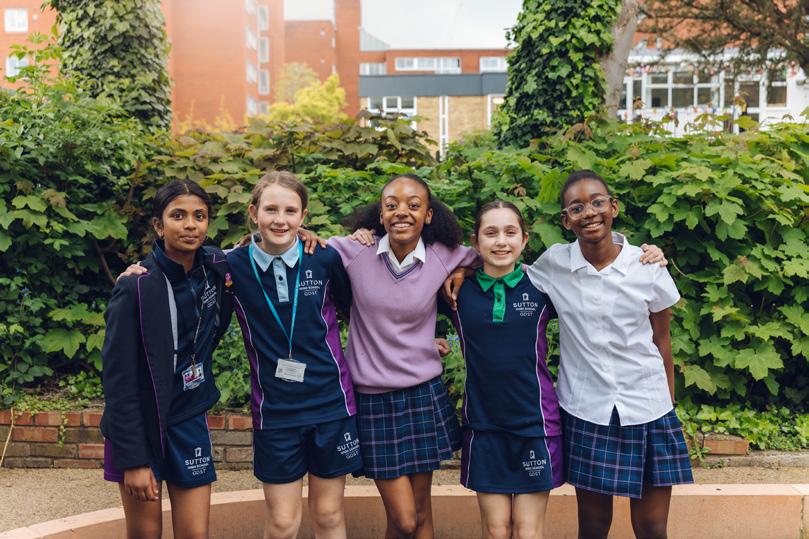
Have you considered leaving a charitable gift in your Will to your school? Leaving just 1% of your estate can change a girl’s life through our bursary programme.
As a GDST alumna, you can write your Will for free using leading will-writing service, Farewill. Get started by visiting www.farewill.com/gdst-girlforlife2025. .

MARY SEAGER
ROOTED IN FRIENDSHIP
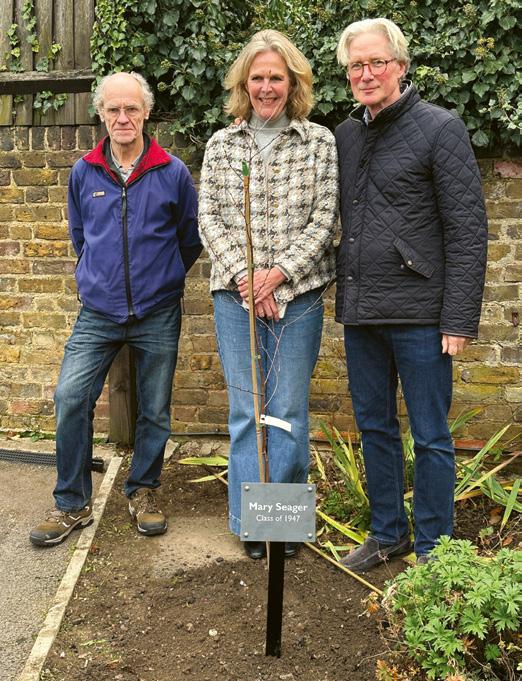
Notting Hill & Ealing High School celebrates the life and legacy of Mary Seager (née Griffin)
Alumna Mary Seager (Class of 1947) was celebrated recently at Notting Hill & Ealing High School (NHEHS), as her family were warmly welcomed to a tree planting ceremony to mark Mary’s generous gift to the OGA Bursary Fund.
Reflecting her ebullient and warm personality, the deep-rooted friendships she made during her school years endured more than 70 years. Her closest friends – Joy Hicks (Class of 1945) and Delia Coulton (Class of 1948) – were as sporty as Mary was, enjoying netball and hockey together, and joining the Sea Rangers for swimming, boating, camping, climbing, wildlife protection and orienteering adventures. After school, their lives became increasingly intertwined when Mary and Delia later married brothers.

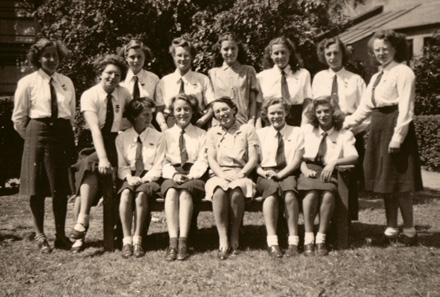
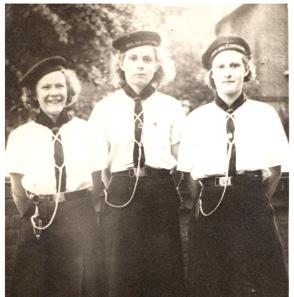
Mary stayed in London during the war, surviving a ‘near miss’ when, in the middle of a mock exam, a bomb went off. She was in a room where the windows were bricked up and described how, with the force of the explosion, the wall imploded and was then sucked out again, shattering all the inkwells on the desks.
She was an eccentric character with a great sense of fun. She enjoyed art and painting and had a passion for travelling and sailing. She frequently took holidays with her husband John on their yacht, sailing all over the world, from New Zealand and the Cook Islands, to Hong Kong and China.
Philanthropic throughout her life, Mary wasn’t a spender herself, preferring to recycle and repurpose clothes rather than throwing them away. She supported hundreds of charities across the country, and left gifts to many of them, from Hull University to Ham Library. And of course, to NHEHS’s OGA Bursary Campaign.
Allison Saunders, NHEHS Head, said, “We are enormously grateful to Mary for including a legacy gift in her

Will to our OGA Bursary Campaign. Legacies do more than support the cause – they also build connection. Mary remained connected to her school friends, and to her school, throughout her life. As our pupils
Leaving a lasting gift
and staff go about their busy lives on our school grounds, we will remember Mary’s love for our school and its commitment to providing all girls with an education that is both aspirational and grounded.”
Remembering your school in your Will is one of the most significant ways you can support future generations of talented GDST girls and young women.
Legacy gifts often take the form of a specific sum of money or a percentage of a person’s estate. We are hugely indebted to those who have recognised the importance of providing for the long-term financial support of the GDST in this way.
If you have any questions about leaving a gift in your Will, please contact the Philanthropy Team by calling 0207 393 6898 or emailing giving@wes.gdst.net
Joining the Minerva Circle
If you have made provision to leave a charitable gift in your Will to the GDST or a GDST school, please be sure to let us know. You will then be included in our Minerva Circle, a special society of those who have made this significant gesture. Members receive a copy of our annual Giving publication and invitations to exclusive supporter events.
Mary’s class photo, 1945 (top row, second from right)
Delia, Mary (middle) and Joy in their Sea Rangers uniform
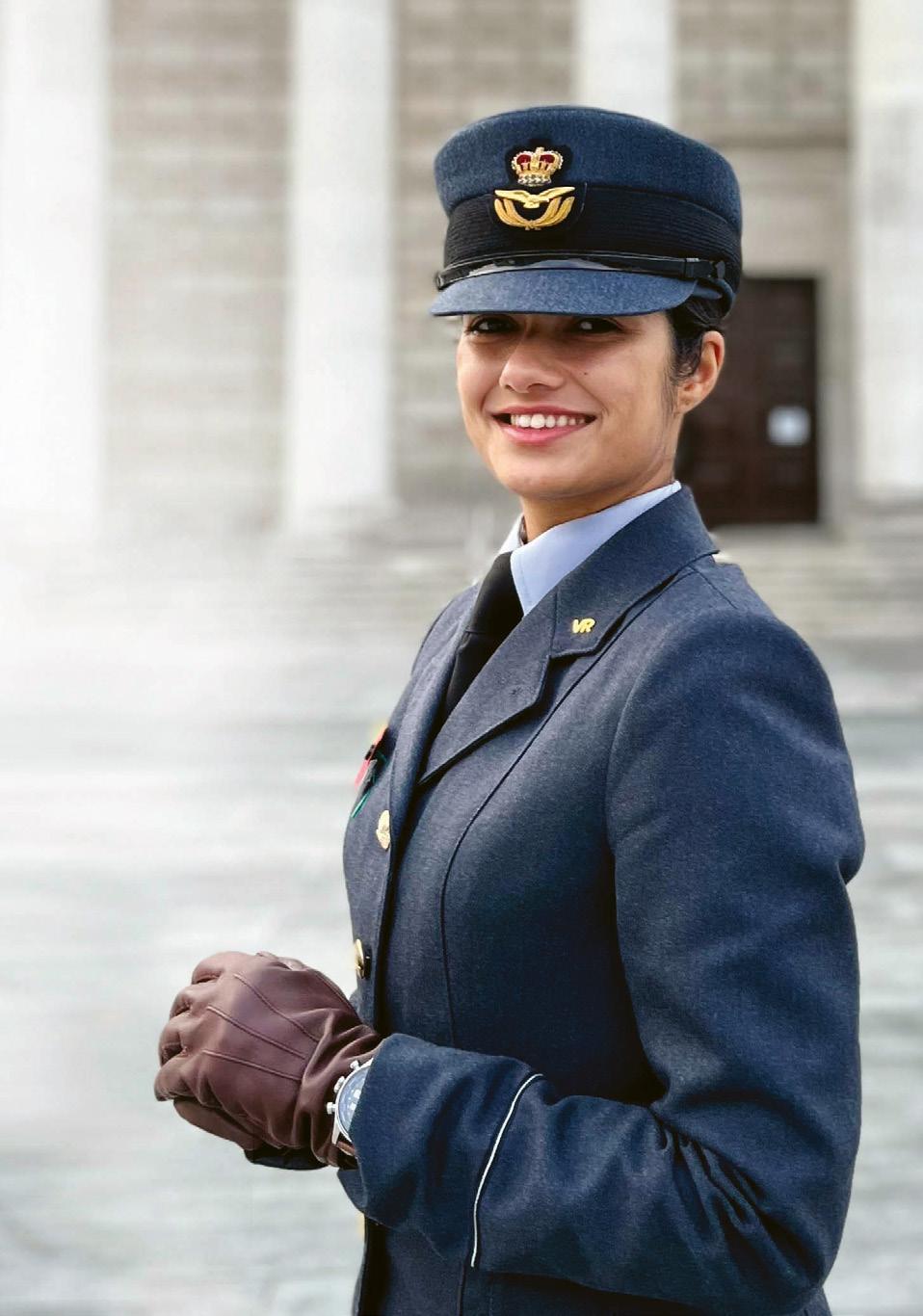
At 15 years old, Maleha Khan’s (Portsmouth High School) world would change forever when she saw the Red Arrows flying squad in action. Propelling her into the complete unknown, she embarked on a path that unfolds along the classic hero’s journey narrative. From the first calling, the hardships, the naysayers, the determination and the reward, Maleha’s journey from Year 10 pupil to pilot and rocket scientist is a testament to her resilience.
TRAILBLAZER OF THE YEAR
A JOURNEY INTO THE UNKNOWN
Maleha Khan arrives at our online interview fresh from back-to-back meetings in her capacity, then, as External Affairs Officer at UK Space Agency (UKSA), and explains her role there and in turn, the Agency’s work to put the UK into the international space race. “It’s very fast developing,” she says, “and not just over decades or years – it’s changing month by month.”
This feels a little like a description of Maleha’s own career. Over and above the fact that she has built a vast and extensive CV in an impressively short time, it is her very personal quest, and the obstacles that she has risen to overcome on the way that make her story such a compelling one. The emotional rollercoaster, the drive, the self-belief and courage it takes to forge your own, unique path.
Born into a family of doctors, and with a natural aptitude for the sciences, life for Maleha looked certain: she would follow her parents and other family members into medicine. Until she saw the Red Arrows at a D-Day Celebration event in 2015 and fell in love. “Literally on that day, I said I wanted to be a pilot.
“For the first time in my life, I had a gut feeling that I knew I had to follow.”
For the first time in my life, I had a gut feeling I knew I had to follow,” she says. “This was when I knew this was the only thing I wanted to do.”
Maleha’s research (or ‘stalking’ as she puts it) led to her joining the Air Cadets, and in spite of resistance from her parents over her sudden departure from medicine, they supported her and drove her, twice a week, to Cadets. “It was a lot for them,” she concedes, “coming home from work after a long day in the hospital and driving me to and from Cadets.”
Maleha took her first flight aged 15 at MOD Boscombe Down. And even as she talks about it now, ten years on, her excitement is intense. She recalls everything from the flight suit, boots, helmet and white gloves, the parachute, the barrel rolls and the leap-to-leaps. “It literally opened the door to a career and stamped
She worked hard, won flying scholarships along the way, and in pursuit of getting her pilot’s licence in 2022, learnt to fly five different types of aircraft. At the same time, she studied Aerospace Engineering at University of Southampton, which she chose because, as she puts it, “Aerospace Engineering was the most connected to flying, and it was also the most challenging degree. I learned a lot not just about planes and the engineering behind planes, but also space. And that’s where space was introduced into my life.” Her future now – as a rocket propulsion PhD researcher with her sights on also becoming a commercial pilot – could take her in any number of directions. “Aviation is great, aviation is cool, but space is just phenomenal and the things that are happening in it are enormous.
“I want to go back to my 15-yearold self again and re-teach myself to follow [my] dreams even if people are telling you not to. I had loads of people say to me that I shouldn’t do a degree if I wanted to be a pilot. And I’ve had people say to me you
“Aviation is great, aviation is cool, but space is just phenomenal and the things that are happening in it are enormous.”
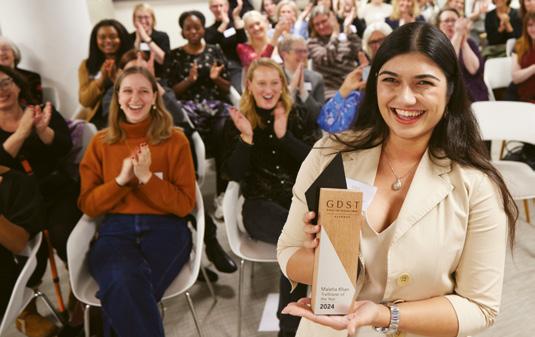
don't need to become a rocket scientist PhD researcher. But then equally, just because other people don't think it's a good idea is not a good enough reason not to do it.”
All the way through, Maleha has fought hard to overcome setbacks – from re-applying for numerous scholarships until she succeeded, to the many jobs she wasn’t offered. She has faced strong opposition –albeit well-intentioned - and says there have been a lot of tears and
insecurities along the way, a lot of arguments, and that she has felt very afraid and alone at times. “I can’t tell you how many times I’ve been in tears, ever since I failed in my first scholarship application and felt like my world had ended.”
It has been hard work. But Maleha has never been afraid of that, and she is now on the brink of becoming master of her own destiny – completing her own personal hero’s journey. When asked if she thought she was brave to

be forging her own path so decisively, she hesitates, “I know the more sensible option right now is to get an airline job and start earning money, so choosing my heart over my brain… yeah, I think I’m being brave.”
Maleha Khan
Maleha Khan, Portsmouth High School alumna and the GDST’s Trailblazer of the Year, is currently enrolled on a PhD programme on rocket propulsion at the University of Cranfield, having previously worked with the UK Space Agency. With a Masters in Engineering in Aerospace, Aeronautical and Astronautical specialising in Spacecraft Engineering from University of Southampton, she gained her private pilot’s licence in 2022, at the age of 22, and is – alongside her research role at Cranfield – working towards her commercial pilot’s licence.
AMANDA BRONKHORST
CHANGING THE WORLD ONE TREE AT A TIME
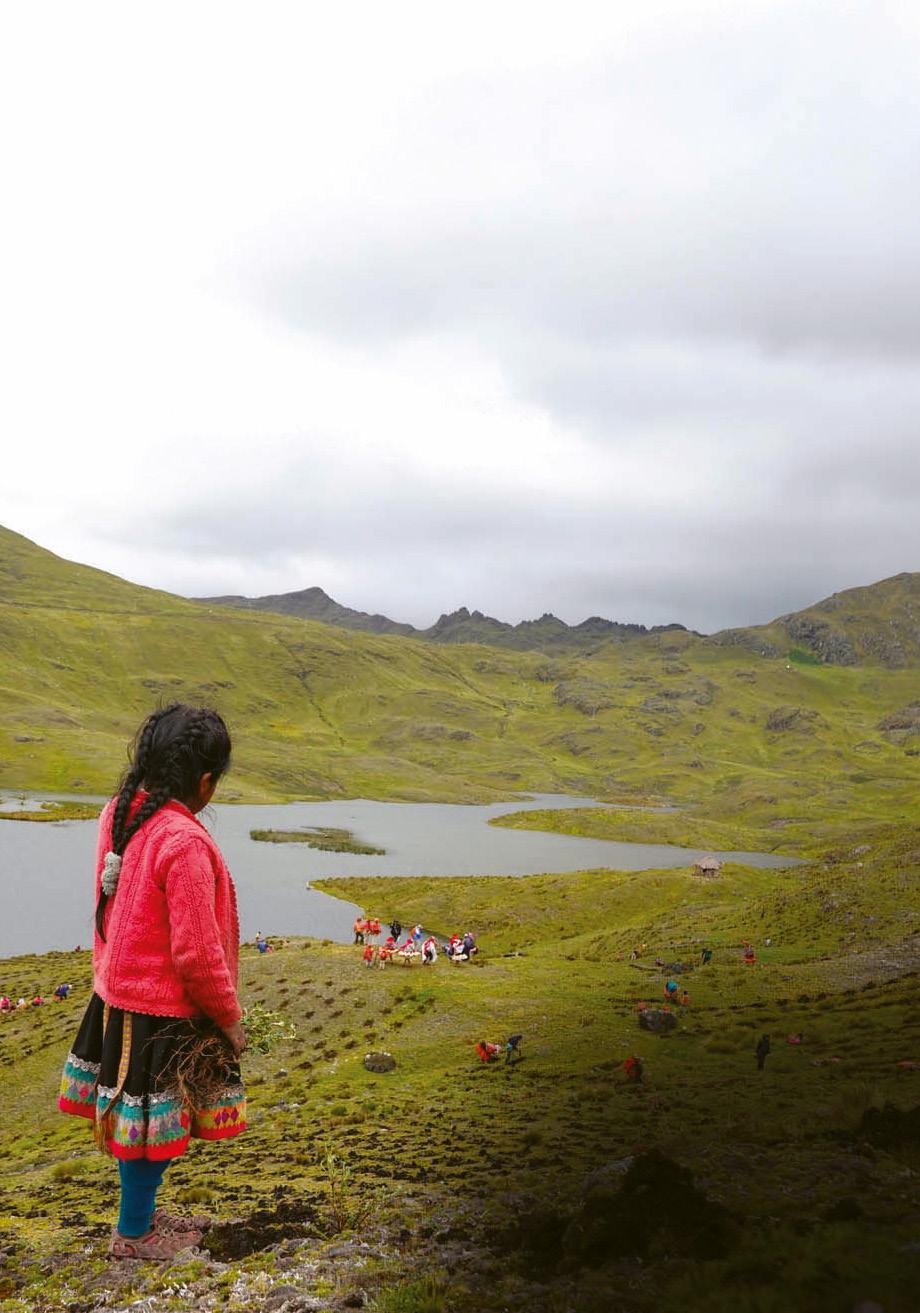
Northwood College for Girls alumna, Amanda Bronkhorst describes her epiphany in 2019 as an accident. Perhaps one of the luckier accidents for our planet, as we found out. She picks up the story of how she was moved to set up JUST ONE Tree.
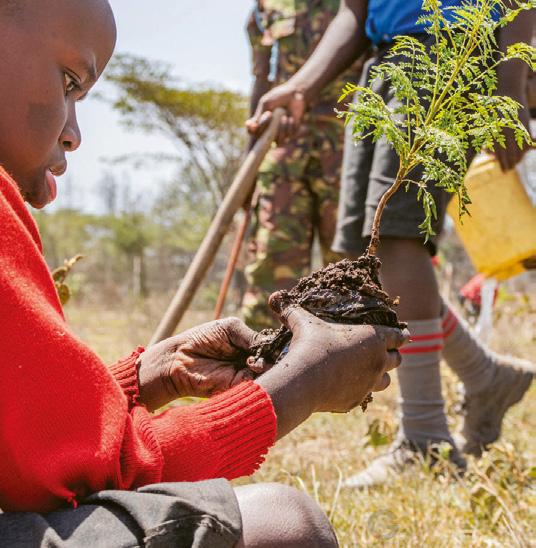
“It was a bit of an accident, really. The story is that I used to be a producer in advertising, something I’d been doing for about 20 years, flying around the world and having a wonderful time. Filming in amazing locations with amazing people.
Then I had my daughter. I had planned to go back into production, but we quickly realised, with my other half in film as well and often working away or being called up at the last minute, that our daughter wasn’t going to get to know me, or us, at all. So, I decided to put my career on pause until she started school, and we’d give three or four years of time just to bring her up.
But when she was two, I sat down to have what I thought was going to be my first uninterrupted cup of tea in almost three years as she went down for her afternoon nap,
picked up the newspaper and the article I happened to read was Greta Thunberg’s speech to Parliament. The speech that said we only have ten years left before we set off irreversible tipping points that will lead to the end of civilization as we know it.
This was back in 2019, when the government hadn’t truly acknowledged that we were in a climate emergency. We weren’t talking about it like we do now –it had felt like something that was going to happen in the future. And then suddenly this article was saying essentially that my daughter will only be 12 when it’s already too late.
And I literally panicked. I was like a rabbit in the headlights, and I didn’t know what to do about it.
I then discovered how cheap it is to plant a tree – only £1 – and I just
thought, well, I’ll plant a tree for my daughter’s future… and I’m pretty sure my friends would too, for their children. And I thought maybe other parents would too.
There are 10 million children in education in the UK alone so I started to wonder what would happen if we could plant a tree for each and every one of them. Then, walking past an estate agent, I began thinking what if a tree was planted every time a property was sold? Or what if Glastonbury added £1 onto every one of their ticket sales? It wouldn’t cost them a penny, but that’s 200,000 trees right there. My brain just kept on going, ‘What if, what if, what if?’ Everything we do has a carbon footprint, so why aren’t we just automatically giving back to the planet?
“Everything we do has a carbon footprint, so why aren’t we just automatically giving back to the planet?
With all this going on in my head, I thought I’d post my thoughts on Facebook and tell people about it. And I raised £75. So, I planted 75 trees.
Then came the next thought: how hard can it be to design a website? Maybe I’ll give it a go and if I plant 900 trees in a year, and that’s where it ends, then that’s 900 more trees out there than if I hadn’t bothered.
So, I did that – and in the first year, we planted three quarters of a million trees.”
This, of course, was just the beginning.
Since 2019, JUST ONE Tree has taken on a life of its own. Under Amanda’s leadership, the team has planted over 5 million trees, capable of absorbing 1.6 million tonnes of CO2. It has planted trees in 16 countries around the world – from Peru to Madagascar - as well as oceanic sites, replenishing the seas’ mangrove and kelp forests. It is a member of the United Nations-backed UN Decade on Ecosystem Restoration and is supported by more than 500 carefully selected corporate partners.
JUST ONE Tree remains crystal clear in its project goals – to tackle reforestation, ocean conservation and environmental education – the latter going back to the company’s genesis and the links Amanda originally made between climate emergency and our children’s futures. There are now more than 700 schools involved in the initiative around the world, with almost 400,000 trees so far having been planted by children. According to its latest data, GDST schools alone have planted over 20,000 trees to date.
And the momentum keeps rolling. Its active education programme, which started with JUST ONE Tree Day, continues with an ever-growing focus on resourcing for schools to show children, parents and teachers the positive impact that just one person can have on the environment. As Amanda says, “According to a recent YouGov survey 78% of children suffer from anxiety about climate change and the future they will inherit, which is a frightening statistic. Our initiative aims to empower them through education and positive action. Our resources help teach them the lessons we never learned, so they don’t make the mistakes we’ve made, and they get to see that they can make a difference when they unite. Which in turn reduces
their climate anxiety.”
Not surprisingly, Amanda’s plans to return to the advertising world are now on indefinite hold. As JUST ONE Tree grows, so too do its ambitions. Along with building understanding through its schools and education programmes, the business is looking to grow the size of its corporate donations, as a step-change in
donations could supercharge its planting rate and range around the world.
And what of Amanda’s own future? “I’ll be happy when climate change is no longer an emergency, when we can start to see the impact of the things that people are doing. And actually, I can’t imagine this not being my life’s work, now,” she says.
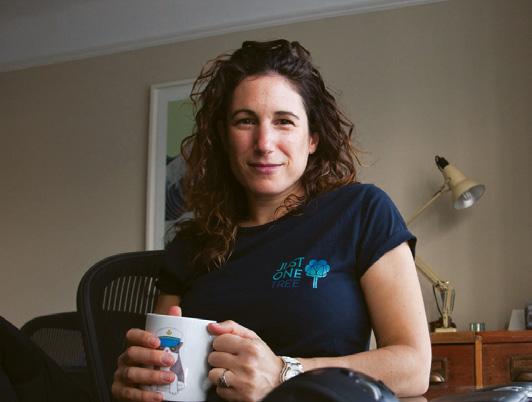
Amanda Bronkhorst
Amanda Bronkhorst is an alumna of Northwood College for Girls and Founder and CEO of JUST ONE Tree, an award-winning nonprofit business working to reverse climate chaos and biodiversity through global reforestation, ocean regeneration and climate education. Amanda was nominated for Woman of the Year in 2023 and is one of the Top 100 Women Social Entrepreneurs in the UK, as well as a finalist in the Social Enterprise UK Environmental Champion Award.
JUST ONE Tree has been recognised as one of the Top 100 Best Organisations to Escape To (Escape the City), a NATWEST Top 100 Social Enterprise, a winner of the London and SE England Prestige Awards, a gold medal winner at the Greengage Sustainability Awards and selected as a partner for the UN Decade on Ecosystem Restoration.
www.justonetree.life @just-one-tree
DCC KATY BARROW-GRINT
ADOLESCENCE - A CAMPAIGN FOR CHANGE
With the aftershocks of Netflix’s Adolescence still reverberating, Oxford High School alumna
Katy Barrow-Grint, Deputy Chief Constable of Gloucestershire Constabulary discusses adolescent domestic abuse and calls for a new, joined-up strategy to identify, intervene in and help prevent teenage relationship abuse.
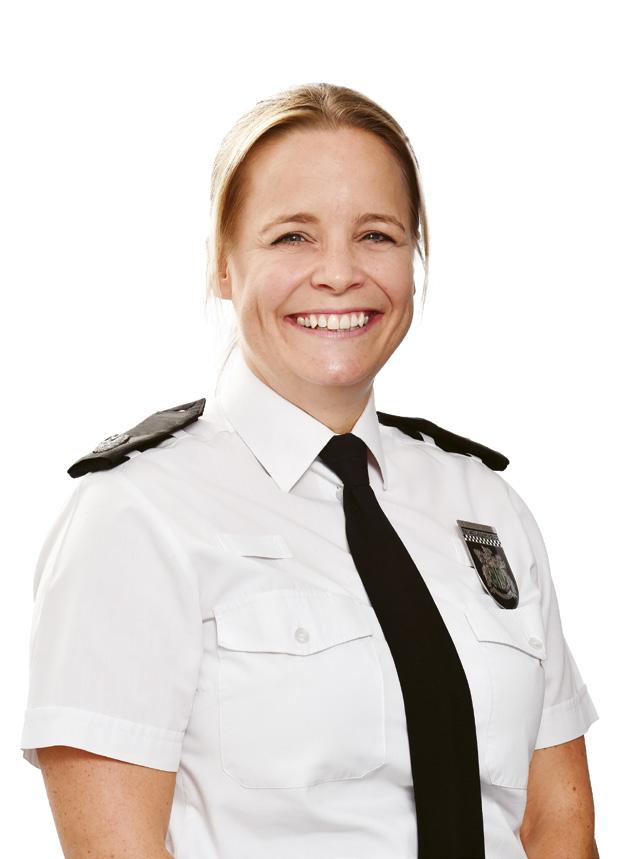
“The murder of 15-year-old Holly Newton in January 2023, stalked and then stabbed to death by her 16-year-old ex-boyfriend was a stark reminder that domestic abuse is not only experienced by adults,” DCC Katy Barrow-Grint says.
Everything about Holly’s story is shocking. And the picture that Katy, an Honorary Research Fellow researching teenage domestic abuse at City St Georges, University of London, paints is a frightening one. As we talk, she rattles off statistics around the rise of domestic abuse in relationships involving under 16s, the growth of the ‘Andrew Tate effect’, the access that children as young as 11 have to extreme pornography and other alarming trends.
Tellingly, Katy also talks about a research and policy ‘blind spot’. “Abuse within young people’s relationships – whether physical, emotional or sexual – is often overlooked in research and policy, which makes it very difficult for agencies like schools, social care and the police to work effectively in this space,” she says. Holly Newton’s case was not classified as a domestic homicide because Holly was under-16s when she died – a frustration that Holly’s mother has spoken openly about.
Katy continues, “According to the Crime Survey for England and Wales (CSEW), young women aged 16 to 19 are at the highest risk of domestic abuse, yet they are less likely to access support services. The CSEW does not include under-16s, which leaves a significant gap in understanding abuse among younger teenagers.
“While the Domestic Abuse Act 2021 recognised children living in abusive homes as victims, it does not extend this protection to children who
are in abusive relationships under the age of 16. Research by SafeLives (2017) found that abusive behaviour in teenage relationships often begins at 14 or 15, but there is limited recognition, support, or prevention for them. This poses significant challenges for professionals across the system in addressing abuse in teenage relationships.”
As a senior police officer, Katy is on the front line where she sees the rise and scale of the issue. But it is in her capacity as a researcher and academic that she believes she can bring change and new thinking to the problem. To this end, she has undertaken significant research studies with Dr Ruth Weir, a Senior Research Fellow in Criminology and Deputy Director of the VISION Consortium; and on her own, has surveyed every single police force in the UK to understand how policing deals with adolescent domestic abuse.
Her findings highlight a number of key areas where change is needed. “First,” she says, “there is no agreedupon terminology for teenage relationship abuse, with terms like ‘adolescent domestic abuse’,
“Social media in particular has normalised unhealthy relationships, outdated views of abuse, and early exposure to violence.”
‘teen dating violence’ and ‘youth intimate partner violence’ all being used inconsistently. Young people are more likely to describe their experiences as ‘toxic relationships’ and often do not recognise abusive behaviours which would in adult cases be described as domestic abuse.
“Social media in particular has normalised unhealthy relationships, outdated views of abuse, and early exposure to violence. The Children’s Commissioner of England and Wales (2023) found that over 27% of children aged 11 have seen extreme pornography on the internet, which is creating a generation of young people who believe that this is a display of a normal intimate relationship.”
Katy also emphasises an inconsistent approach to identifying teenage relationship abuse in schools across the country. “Unlike adult domestic abuse, teenage relationship abuse often occurs in public settings like schools. Schools are therefore crucial for early intervention and education on healthy relationships; it follows that positive school environments reduce victimisation risks, while negative experiences such as feeling unsafe or disconnected increase vulnerability.”
Measurement and knowing the size of the problem is a further area Katy highlights. “Abuse among under-16s is poorly documented due to the Home Office definition of ‘domestic abuse’, which excludes this age group. Policing practices often fail to flag domestic abuse in under-16s, leading to inconsistent data collection. For instance, Holly Newton’s murder was classified as knife crime rather than domestic abuse, highlighting systemic recording issues. Social care data
is also often unquantifiable, which further obscures the scale of the issue.”
“Some forces are starting to identify and record teenage relationship abuse using Multi Agency Safeguarding Hubs to manually or robotically identify cases. This is at a very early stage however, and standardisation across all police forces and other partner agencies in the future would be the ideal.
“With all of this, current systems struggle to address teenage relationship abuse effectively. Youth Justice Services rightly hesitate to criminalise young offenders, while alternative interventions are scarce. Schools face rising mental health
“Young women aged 16 to 19 are at the highest risk of domestic abuse.”
challenges and higher referral thresholds, leaving them underresourced to support students. And discussions on lowering the statutory age for domestic abuse to 13 or lower concluded that systemic changes are needed to support young people before making legal adjustments, rather than simply reducing the current statutory age limit.”
Recommendations in a policy brief by DCC Katy Barrow-Grint and Dr Ruth Weir, entitled Addressing Abuse in Teenage Relationships include:
• Develop a national strategy for prevention and early intervention
• Provide support for both victims and those exhibiting harmful behaviours
• Commission research focused on under-16s
• Improve data collection to better measure abuse prevalence
• Agree on terminology and implement educational programmes to raise awareness
• Gather police specific responses on handling under-16s in abusive relationships
• Map local partnership responses to teenage abuse
• Use natural language processing to analyse social care case files for abuse data
• Trial school-based data collection on unhealthy relationship indicators
• Conduct systems mapping with SafeLives to better understand local responses
In summary, Katy says, “Holly’s tragic case brought this issue into the mainstream. We know we have to do more, and we have to do it quickly. We are therefore calling for a whole system responsewith experts across disciplines including health, education, crime, policing, mental health, social care, economics, data, legal and technology to bring the best minds together. Because our children’s world is not the one we grew up in, and we have to engage with this.”
Oxford High School alumna Katy Barrow-Grint is Deputy Chief Constable of Gloucestershire Constabulary. Prior to moving into this role in November 2024, she spent 24 years in Thames Valley Police. She is also an Honorary Research Fellow at City St George’s, University of London, where she researches adolescent domestic abuse with Dr Ruth Weir.
If you would like any further information on this initiative, or feel you could help in some way, do please contact katy.barrow-grint@ gloucestershire.police.uk or ruth.weir@city.ac.uk
If you, or someone you know, have been affected by the issues raised in this article you can contact the National Domestic Abuse Helpline on 0808 2000 247.
Katy Barrow-Grint
Keep us in the loop.
Keep
us in the loop.
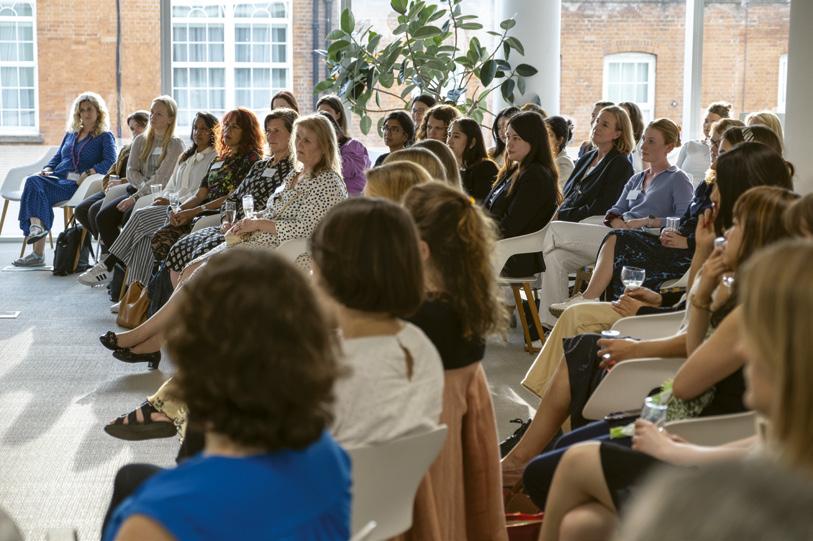

Be the first to hear about exclusive events, inspiring stories, and exciting opportunities from the GDST Alumnae Network - delivered straight to your inbox.
Be the first to hear about exclusive events, inspiring stories, and exciting opportunities from the GDST Alumnae Network - delivered straight to your inbox.
Let us know how and when you’d like to hear from us, and update your details if they’ve changed. Scan the QR code or email info@gdstalumnae.net today.
Let us know how and when you’d like to hear from us, and update your details if they’ve changed. Scan the QR code or email info@gdstalumnae.net today.
Don’t miss out - stay connected!
Don’t miss out - stay connected!


THE SOUNDTRACK TO OUR SCHOOL DAYS
Marina Evans, Blackheath High School alumna from the Class of 1983 describes a very special school reunion.
In May 2023, the Class of 1983 gathered once more at Wemyss Road to celebrate 40 years since leaving Blackheath High School. The reunion was filled with warmth, laughter, memories, and a walk down memory lane - literally. After catching up at the school, we retraced our steps to the playing fields at Kidbrooke, found a patch of grass beside a junior school activity camp, and played a specially curated throwback playlist that brought the past rushing back.
Music has an extraordinary ability to transport us. Scientists say it’s because it activates parts of the brain linked to memory and emotion, which explains why certain songs become forever tied to moments
in time. For me, that moment is the autumn of 1976, and the song Mississippi by Pussycat. It topped the charts seemingly forever, and I wasn’t a fan. But whenever I hear it now I’m right back in that cloakroom as a new UIII girl on a rainy day, changing into my awful £1 indoor shoes. No one else seems to remember the song, perhaps because their shoes weren’t quite so tragic!
As we all reminisced, what stood out was how many of our favourite songs were by British artists. One of the most iconic was local legend Kate Bush, who grew up just around the corner in Welling. Her debut single Wuthering Heights (1978) and later hit Babooshka (1980) were timeless classics then, and now, thanks to a new generation discovering her through remixes like Running Up That Hill, they live on.
Many of us were still too young, and perhaps blissfully unaware of the economic struggles gripping the country, to fully connect with the raw energy and rebellion of the Punk movement, which had emerged from the socio-political unrest of mid-70s London. Still, we couldn’t help but be captivated during break times as Gervase and Jessica regaled us with tales of their trips to the King’s Road, the heart of Punk culture.
The Jam and The Clash found their way onto some of our mixtapes, but it was the arrival of New Wave,
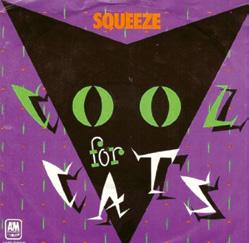
Two Tone, and Ska that captured our imagination. Squeeze gave us unforgettable anthems like Cool For Cats and Up The Junction, both released in 1979. My brother used to spot Jools Holland - Squeeze’s keyboardist and vocalist - picking up his younger brother from Colfe’s in an impressive line-up of cars. It all seemed impossibly cool back then.
Chant No.1 (1979) by North London New Romantic band Spandau Ballet, Don’t You Want Me (1981) by The Human League, and Too Much Too Young (1979) by The Specials quickly became favourites. One classmate remembers her mum praising the lyrics and message of Too Much Too Young while ‘trying to engage me in a discussion on safe sex!’
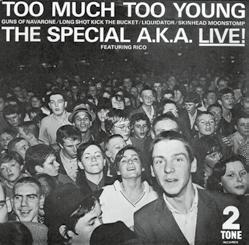
Some of us associated the songs of those years with Colfe’s discos— often our first taste of a night out! We danced in self-conscious circles, handbags on the floor, and the best song of all was Baggy Trousers (1980): the whole room erupted with everyone singing and dancing in that crazy Madness way.
A soundtrack of our school years wouldn’t be complete without the memory of dancing in our PE class to Gloria Gaynor’s 1978 classic I Will Survive , clad in thick navy knickers - equal parts mortifying and magical. And of course, there was Grease. Dawn and I queued for three hours outside Welling Cinema
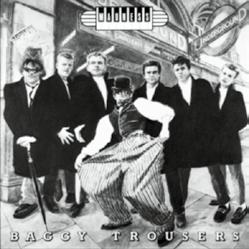
in 1978 to see the iconic film that captured the highs and heartbreaks of teenage love and transformation. It felt like it was made just for us, perfectly echoing the excitement and uncertainty of growing up.
Looking back, these songs were more than just background noise. They were the soundtrack to our school years. From the cloakroom to the common room, they captured the highs, lows, and unforgettable moments of adolescence. And now, 40 years later, they still have the power to make us smile, sing along, and remember exactly who we were back then.
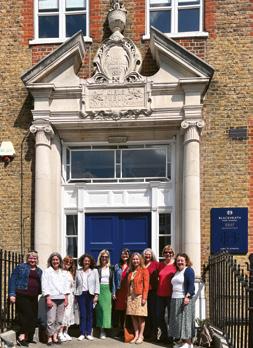
Blackheath High School’s Class of 1983 reunited
THE WRITE STUFF
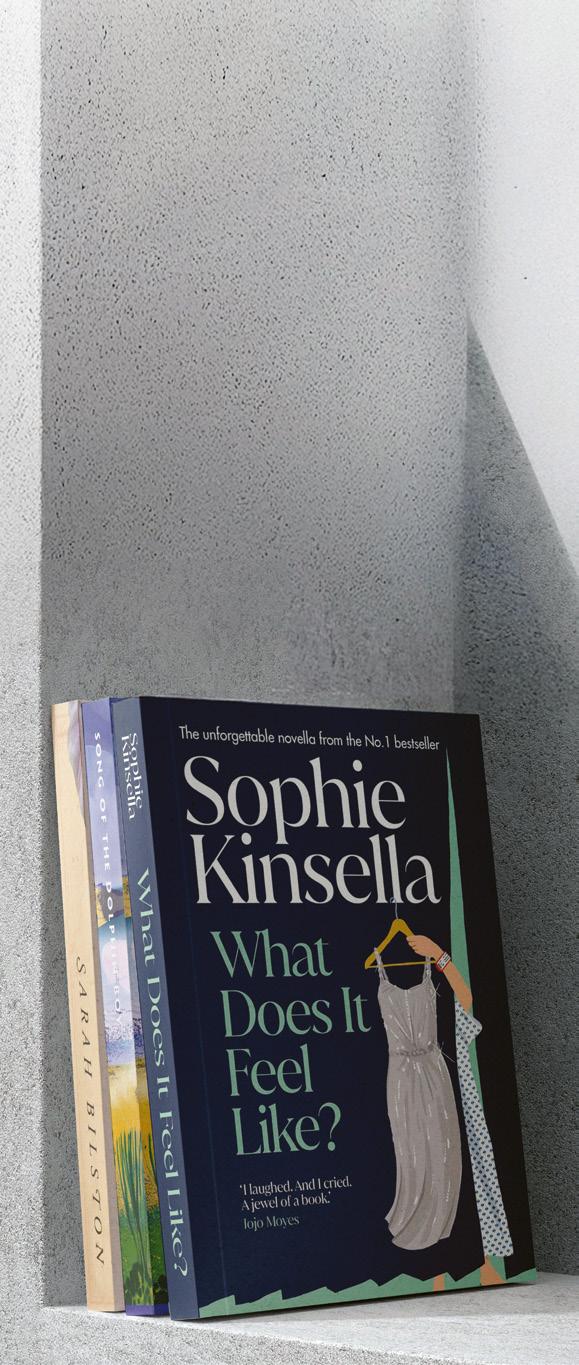
If you’re looking to find something new to read, here are a few new books in print from our alumnae network.
FICTION
A Patient Woman by Sarah Firisen (Croydon High School)
A Single Obsession (The Merry Romances Book 3) by Rachel Knowles (Sutton High School)
Anything For You and Burn This by Sophie McKenzie (Sydenham High School)
Death Rocks: A DCI Ryan Mystery (The DCI Ryan Mysteries Book 21) by LJ Ross (Newcastle High School for Girls)
Stealing Dad by Sofka Zinovieff (Putney High School)
The Guests and They Had It Coming by Nikki Smith (Croydon High School)
The Homemade God by Rachel Joyce (Sydenham High School)
The Midnight Carousel by Fiza Saeed McLynn (Wimbledon High School)
The Reset by Jasmine Dennison (Sheffield High School for Girls)
Under the Lemon Tree by Emma Lloyd-Cowell (Croydon High School)
What Does it Feel Like? by Sophie Kinsella (Putney High School)
NON-FICTION
A Social History of Amateur MusicMaking and Scottish National Identity: Scotland’s Printed Music, 1880-1951 by Karen McAulay (Norwich High School for Girls)
All Booked Up: A Reading Retrospective by Susan Elkin (Sydenham High School)
Beside the River and Beside the Sea (violin); Piano Flowers and Piano Nativity (piano) by Ruth Sellar(Oxford High School)
Bog Witch: A Semi-Mystical Immersion into Wild Wetland Habitats, their Myths, Magic and Meaning by Mab Jones (Howell’s School, Llandaff)
Deep Listening by Emily Kasriel (South Hampstead High School)
Emile Zola by Rachel Bowlby (Croydon High School)
Exploding Tomatoes and Other Stories: The Food and Flavours of Southern Italy by Sophie Grigson (Oxford High School)
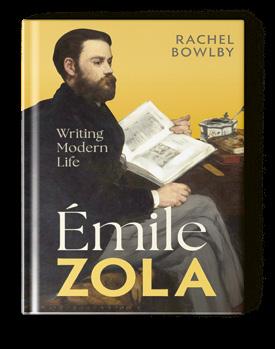
Making a Baby: A Clear and Comforting Guide to Natural Conception and IVF by Sarah Rayner (Putney High School)
Painting the Plate by Felicity Souter (Oxford High School)
Self-Made: The Definitive Guide to Business Startup Success –2nd Edition by Bianca Miller-Cole (Sydenham High School)
The Lost Orchid: A Story of Victorian Plunder and Obsessions by Sarah Bilston (Ipswich High School)
The Money Manual by Abigail Foster (Croydon High School)
The Pink, White and Blue Universe by Meira Chand (Putney High School)
The Reality of Assisted Dying: Understanding the Issues by Ilora Finlay, The Baroness of Llandaff (Wimbledon High School)
The Secret Life of SENCOs: Practical Insights on Inclusion and Specialist Provision by Maxine O’Neill (Birkenhead High School Academy)
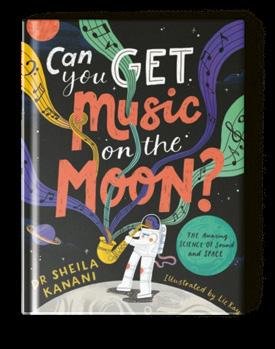
CHILDREN & YOUNG ADULTS
Ajay and the Red-Winged Prince and Shyla’s Wood Wide Web (The Woodland Explorers Club series) by Ewa Jozefkowicz (Notting Hill & Ealing High School)
Can You Get Music on the Moon? by Dr Sheila Kanani (Wimbledon High School)
Fletcher’s Colours by Julia Rawlinson (Putney High School)
Say What?! by Clare Luther (Putney High School)
Sleepytime Stories for Little Children by Rachel Firth (Sheffield High School for Girls)
Song of the Dolphin Boy by Elizabeth Laird (Croydon High School)
Switchling by Sarah Mars (South Hampstead High School)
The Forest of a Thousand Eyes by Frances Hardinge (Ipswich High School)
The Map that Led to You by Ella McLeod (Streatham & Clapham High School)
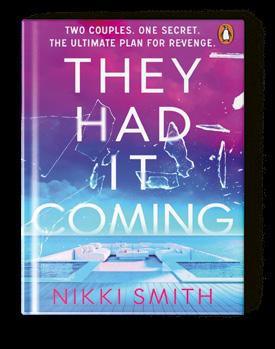
Elements of the Day by Samantha Lewis (Brighton Girls)
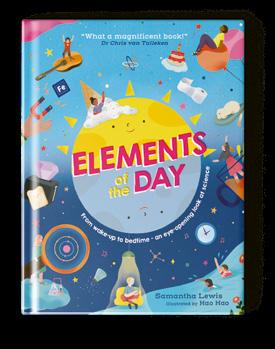
AL UMNA E
facebook.com/GDSTalumnae @GDST
GDST Alumnae Network
HOW TO KEEP UP TO DATE
We would love to stay in touch with you. As most of our communications now take place by email, please make sure we have your current email address by contacting us at info@gdstalumnae.net, or updating your details via our alumnae portal www.gdst.net/alumnae/portal
HOW WE LOOK AFTER AND USE YOUR DATA
We promise that your details are safe with us – you can view our privacy policy at www.gdst.net/privacy-notice/. You can choose how we contact you by updating your details on our alumnae portal.
HOW TO FIND OUT MORE
Phone us on 020 7393 6898 or email us at info@gdstalumnae.net
The opinions expressed in this publication do not necessarily reflect the views of the GDST. All reasonable attempts have been made to clear copyright before publication.
